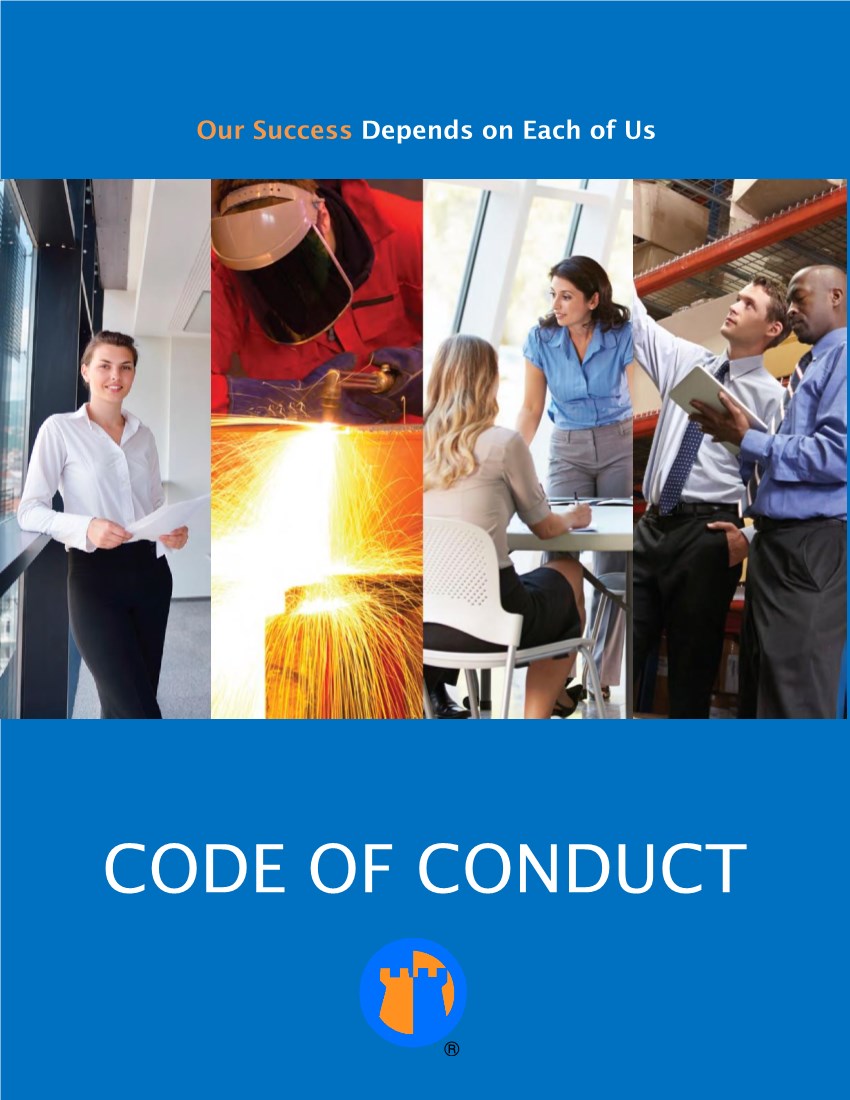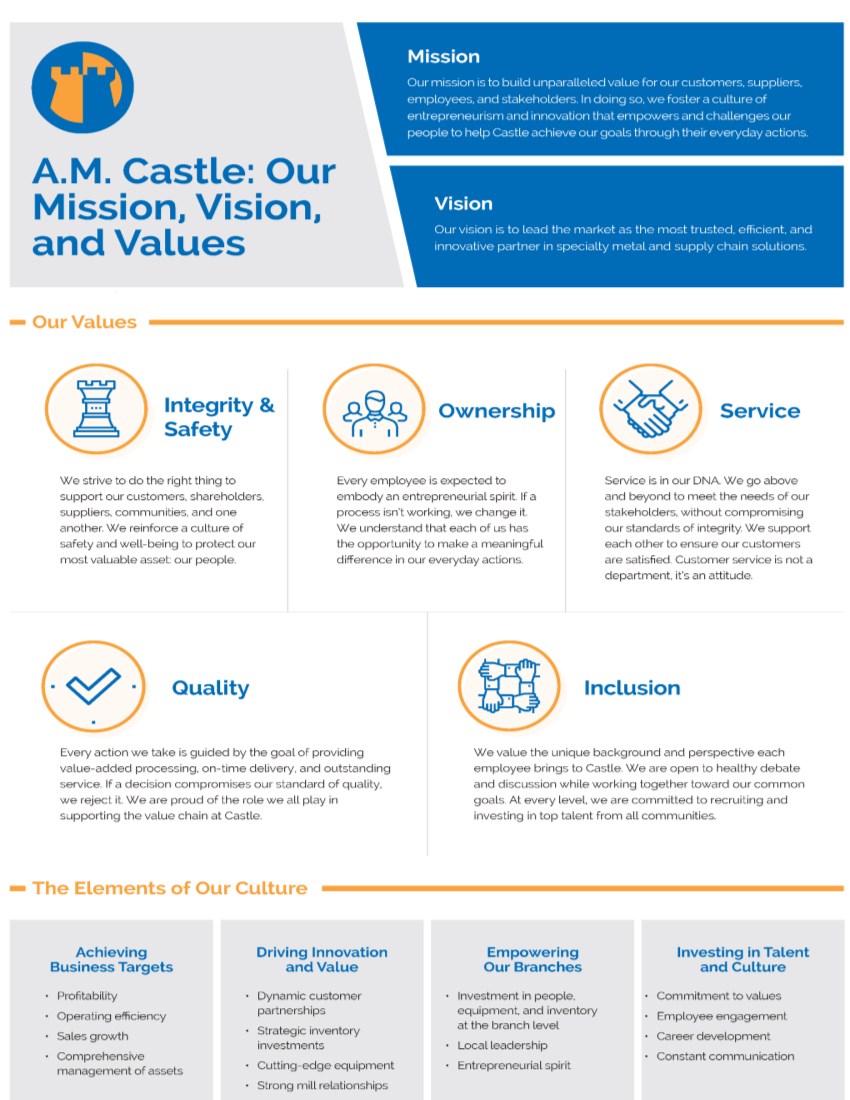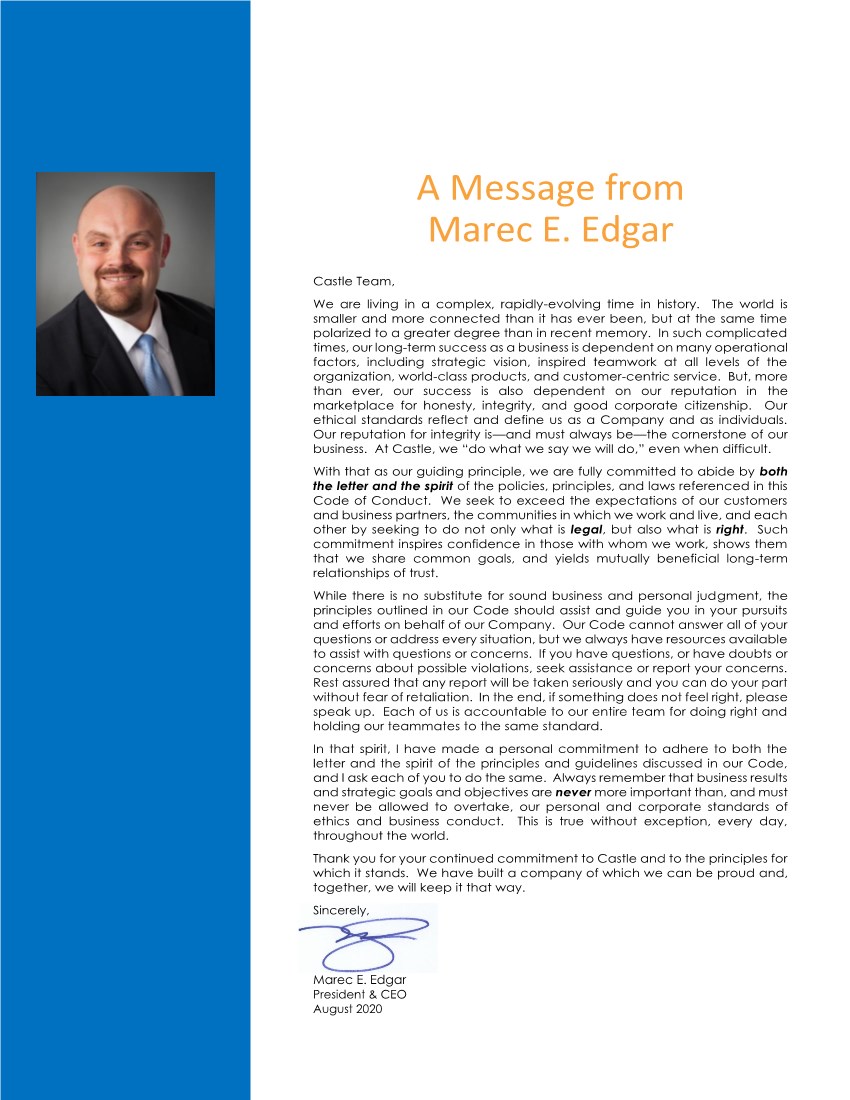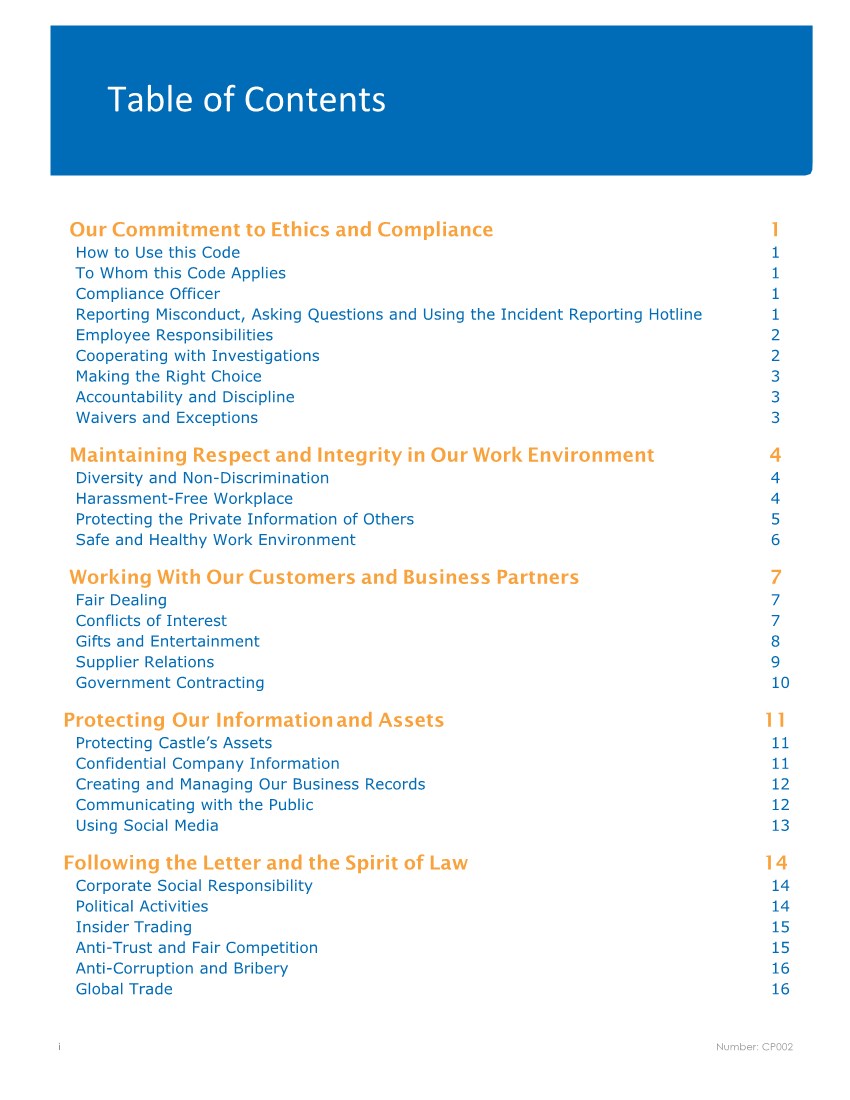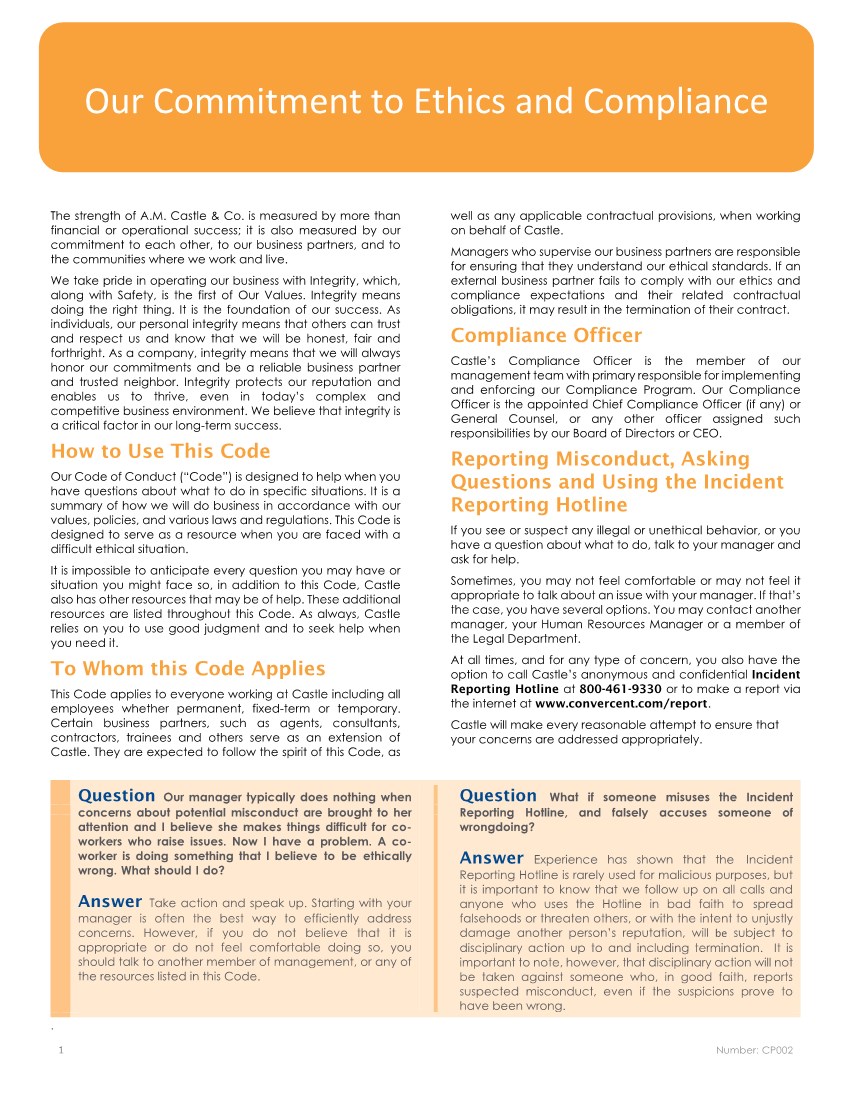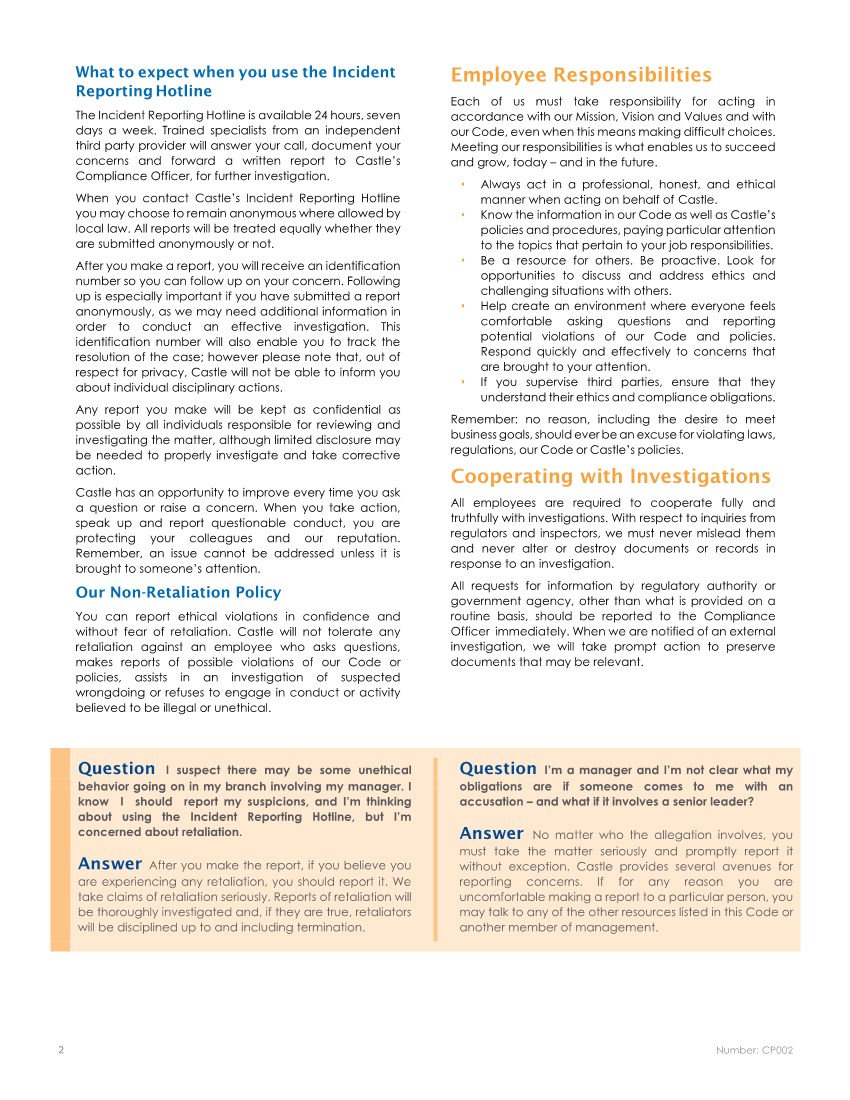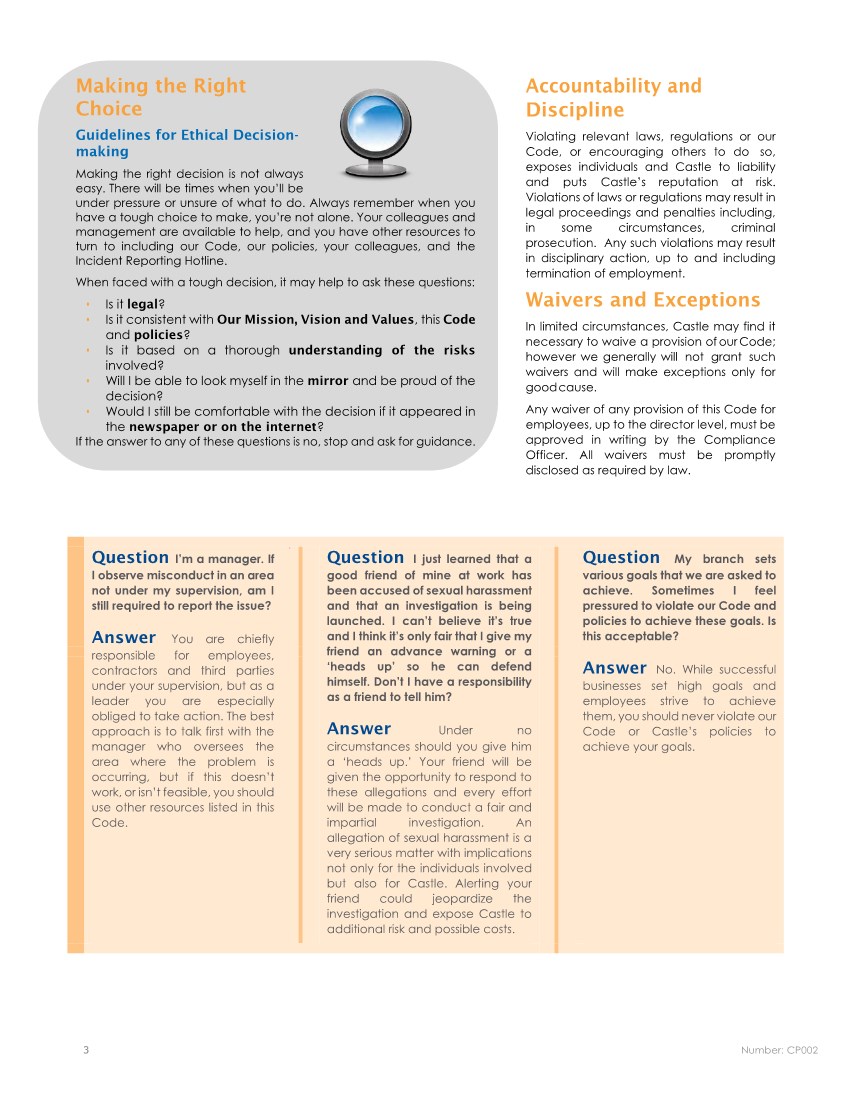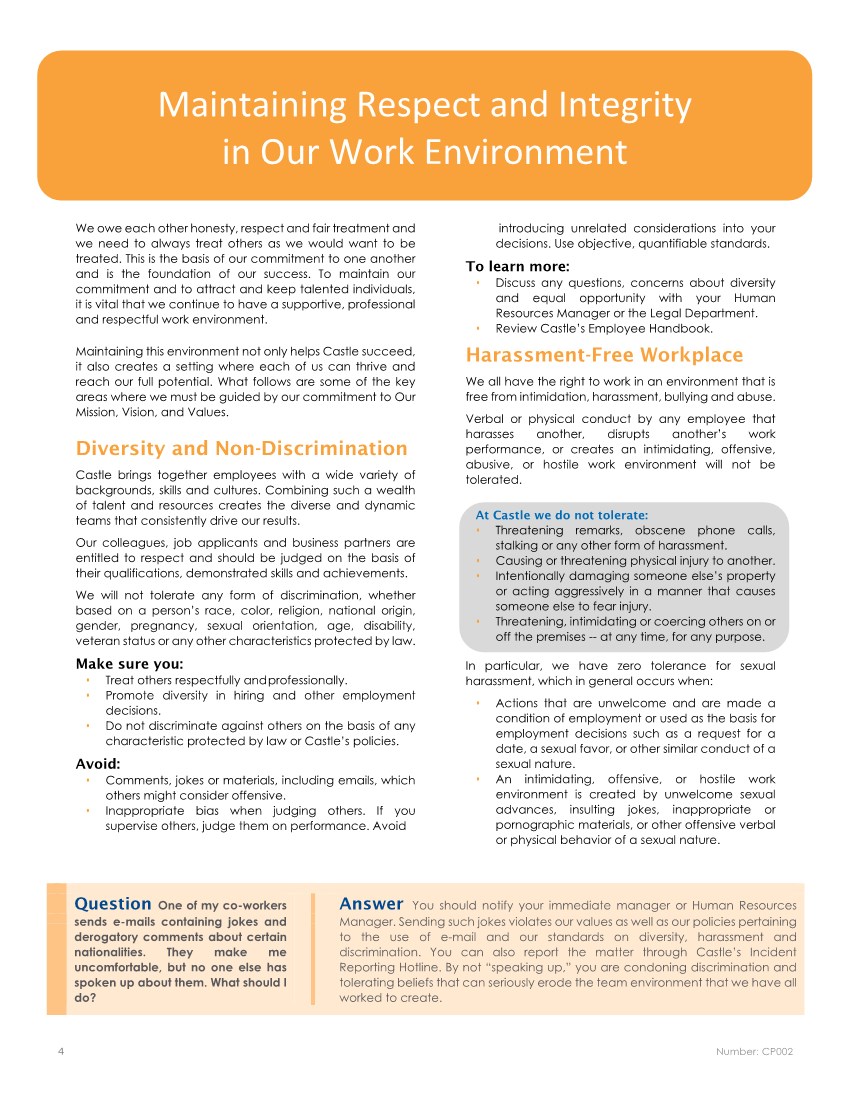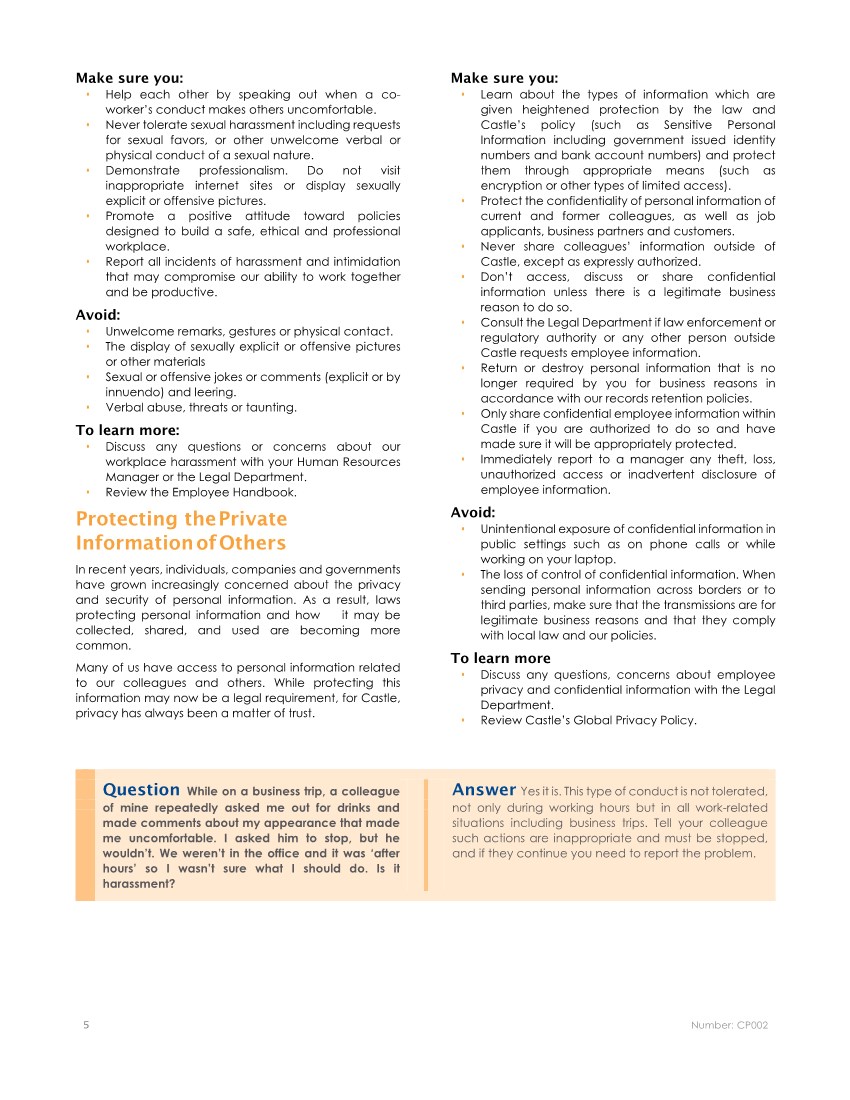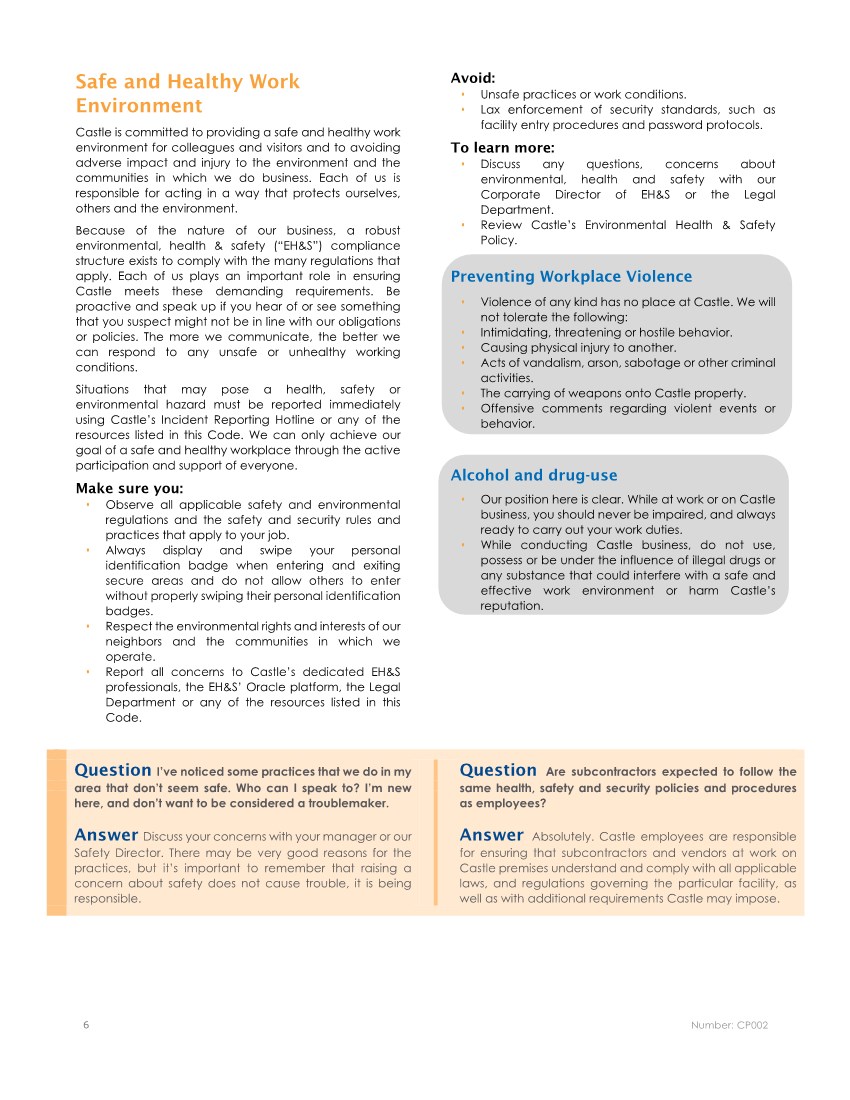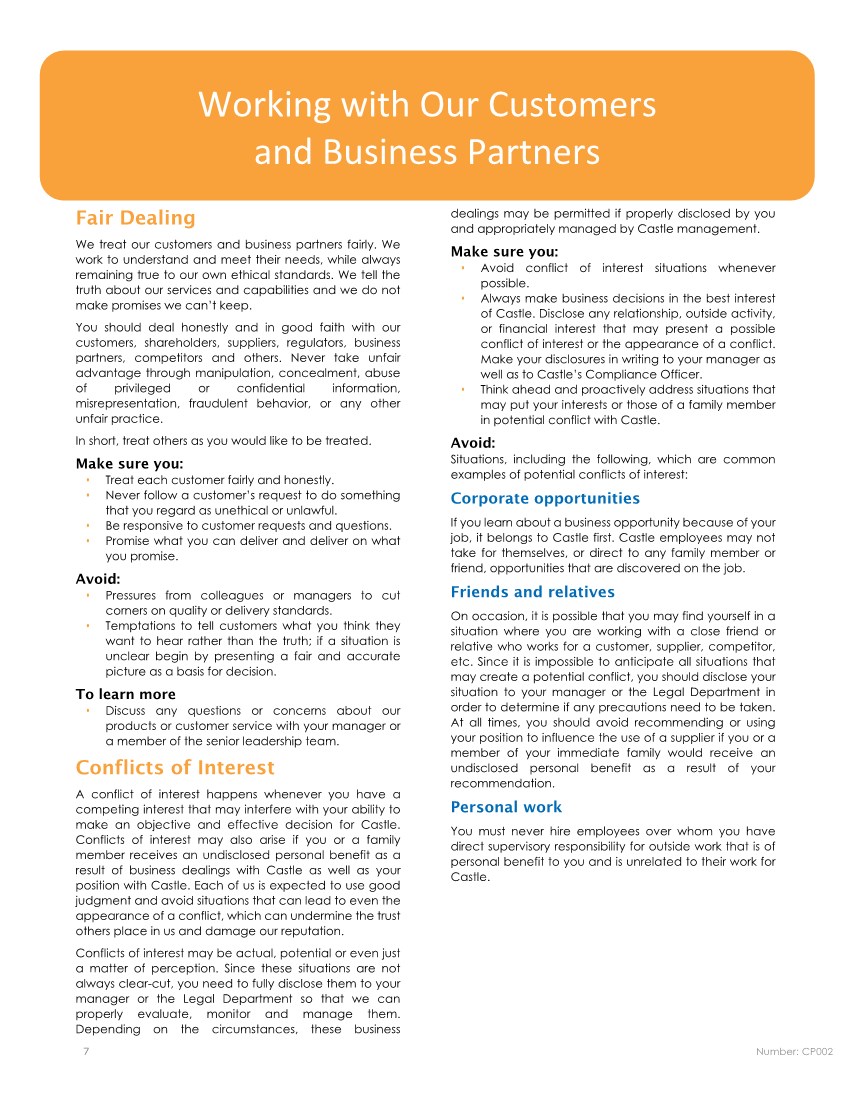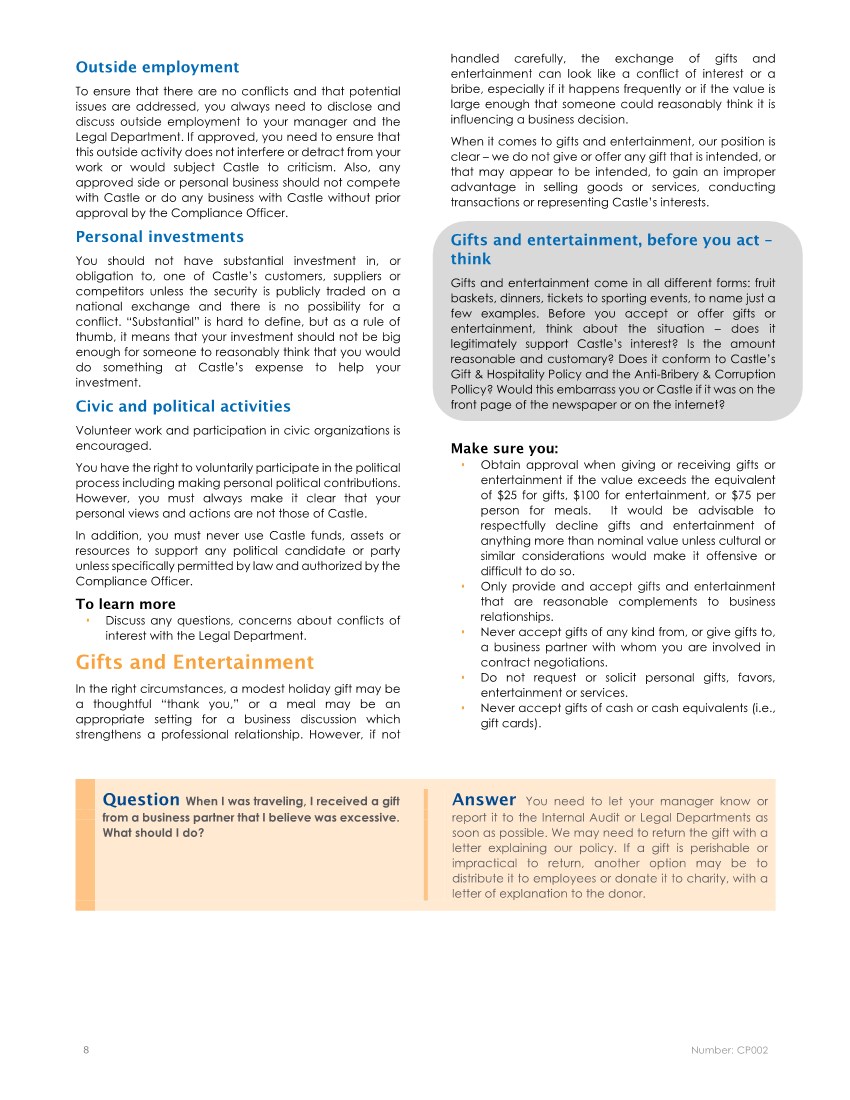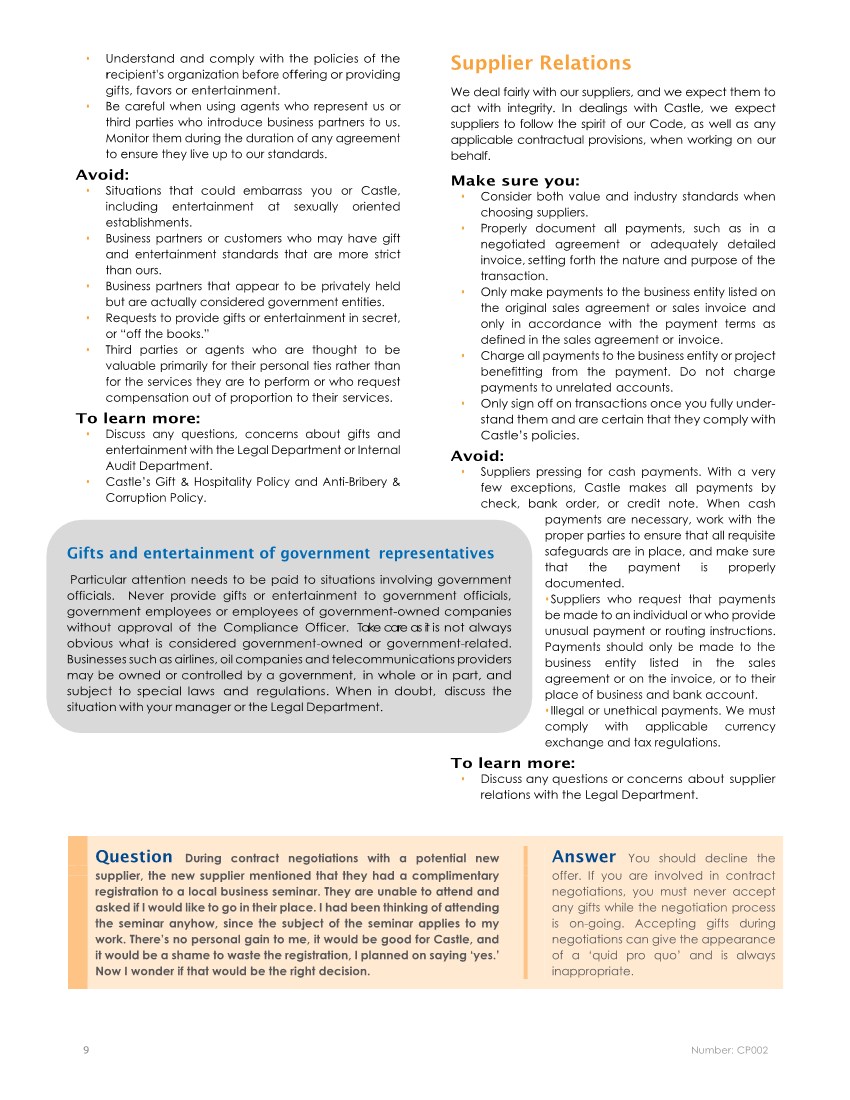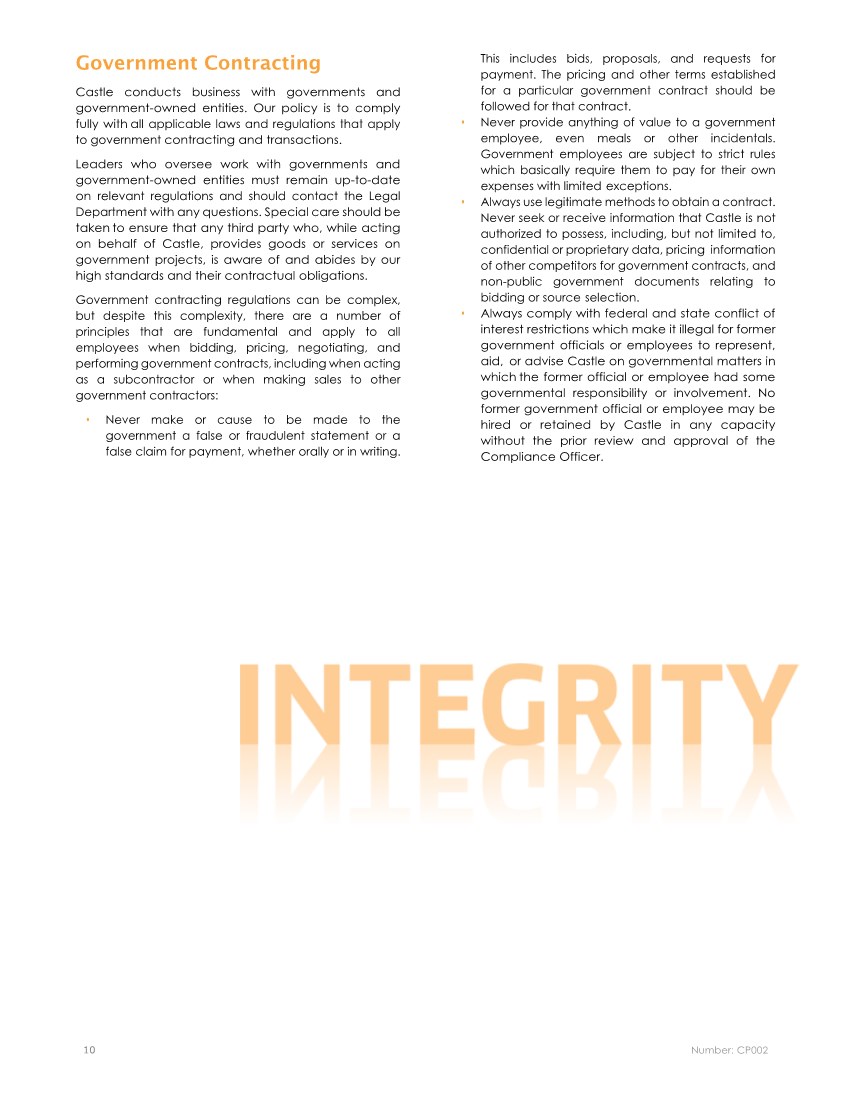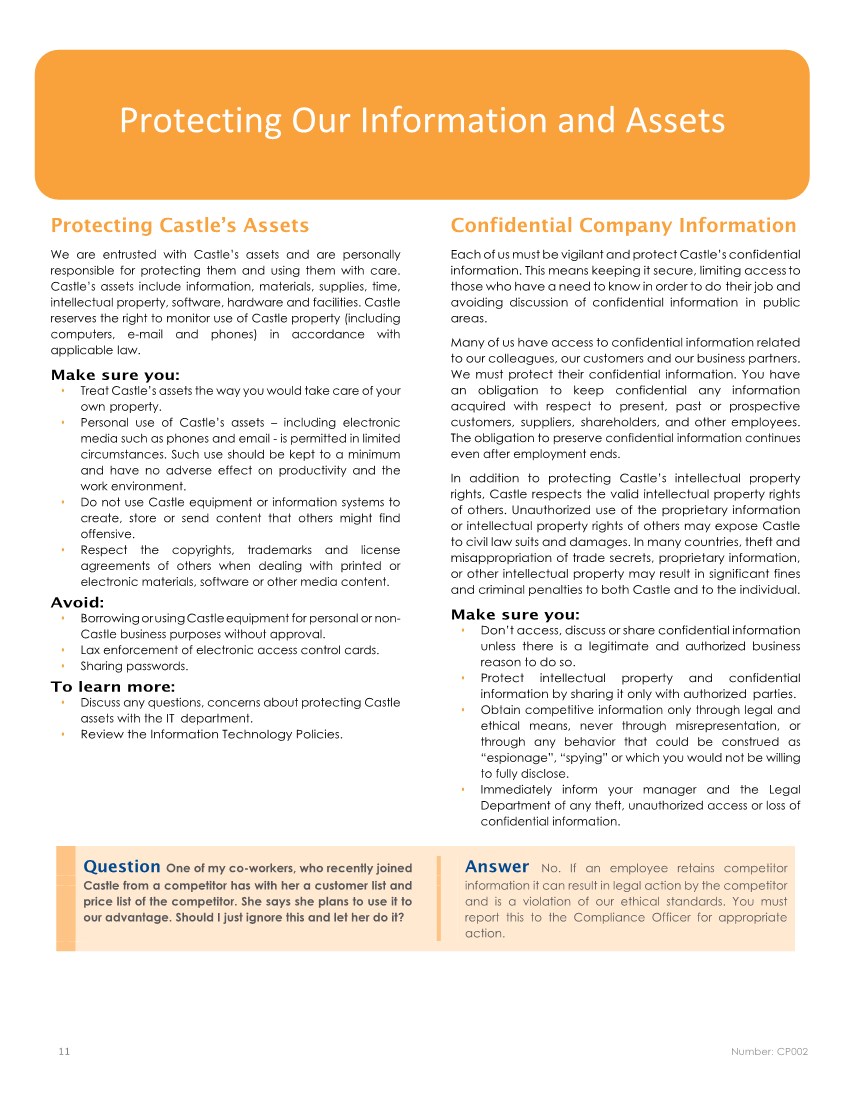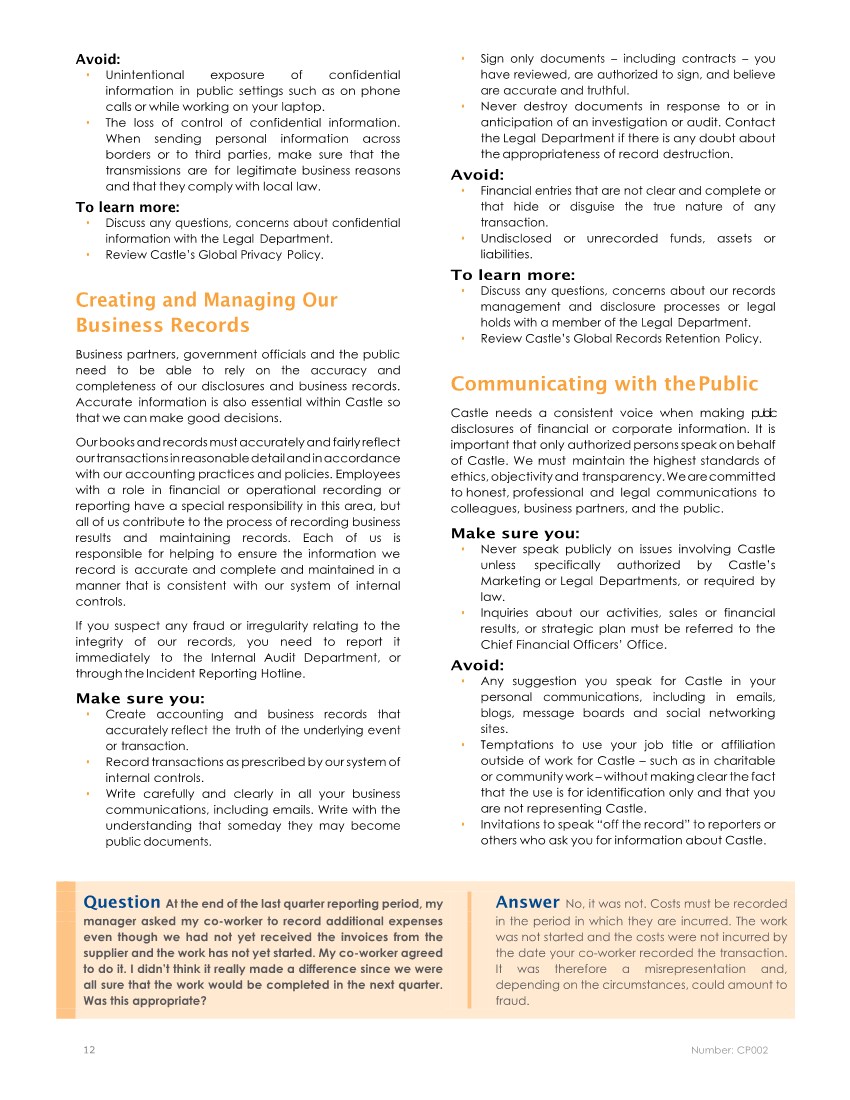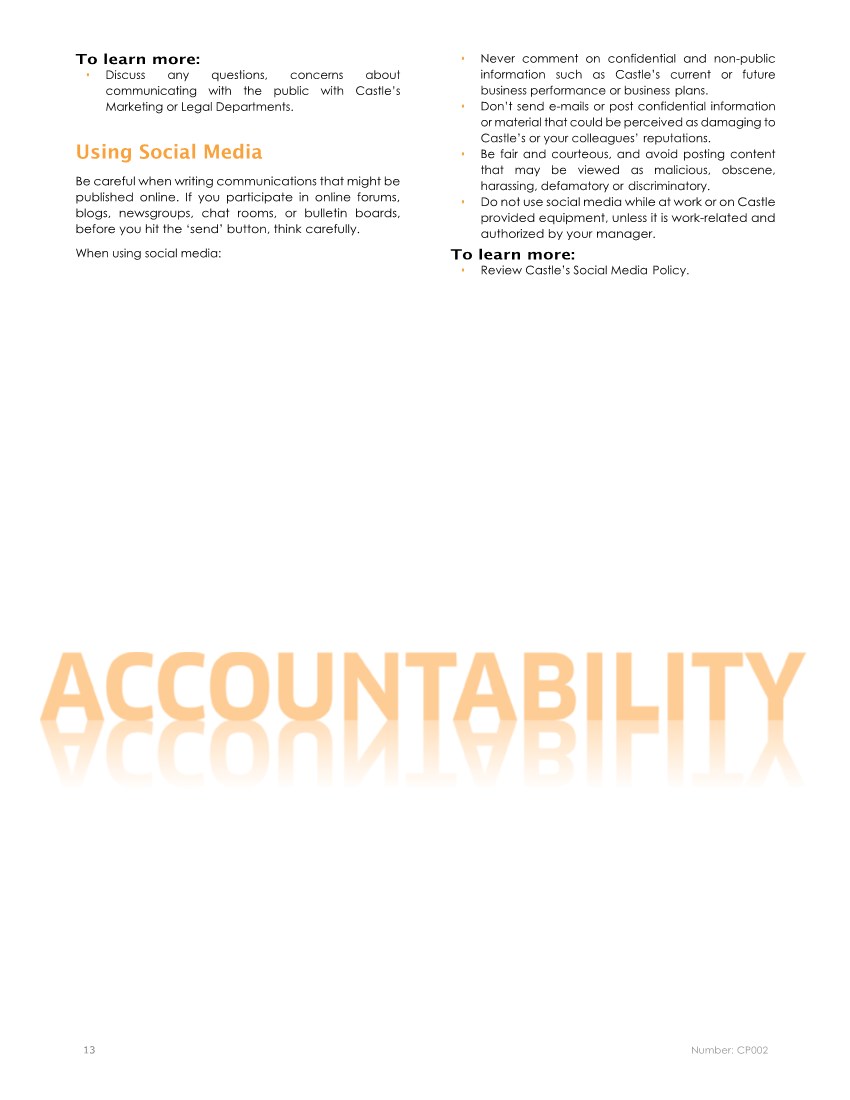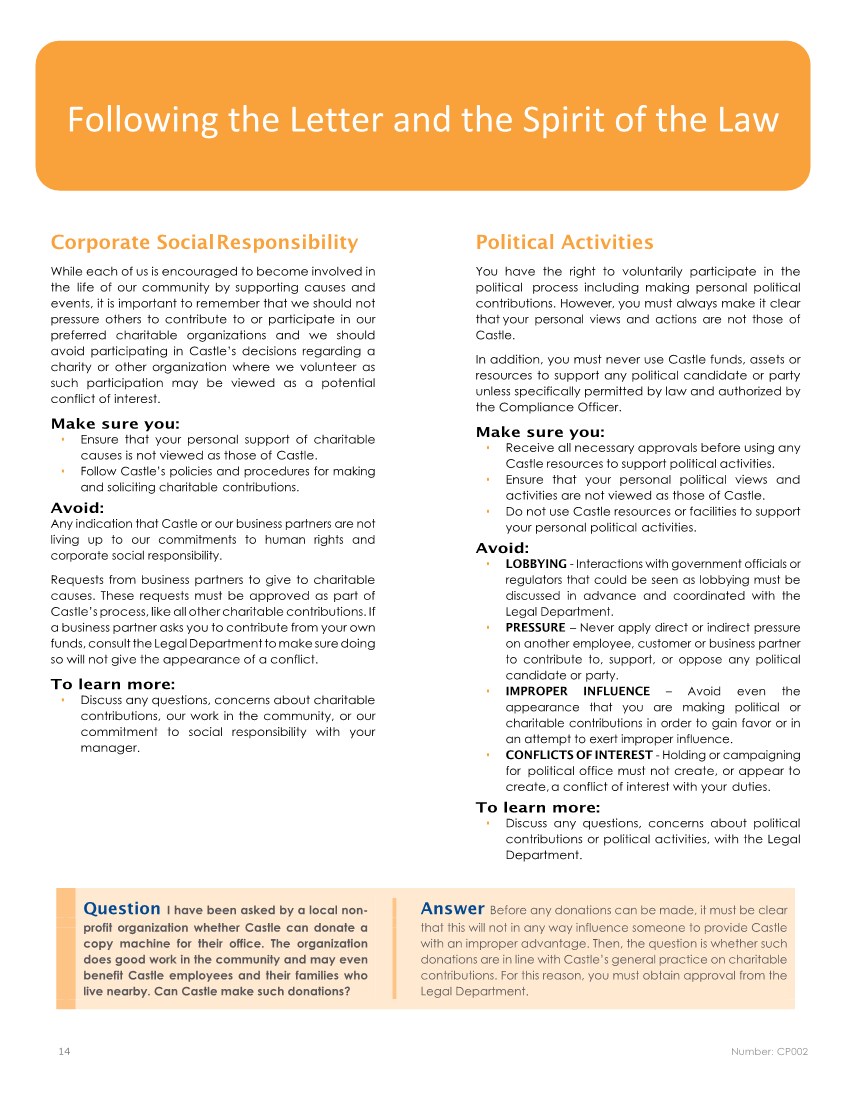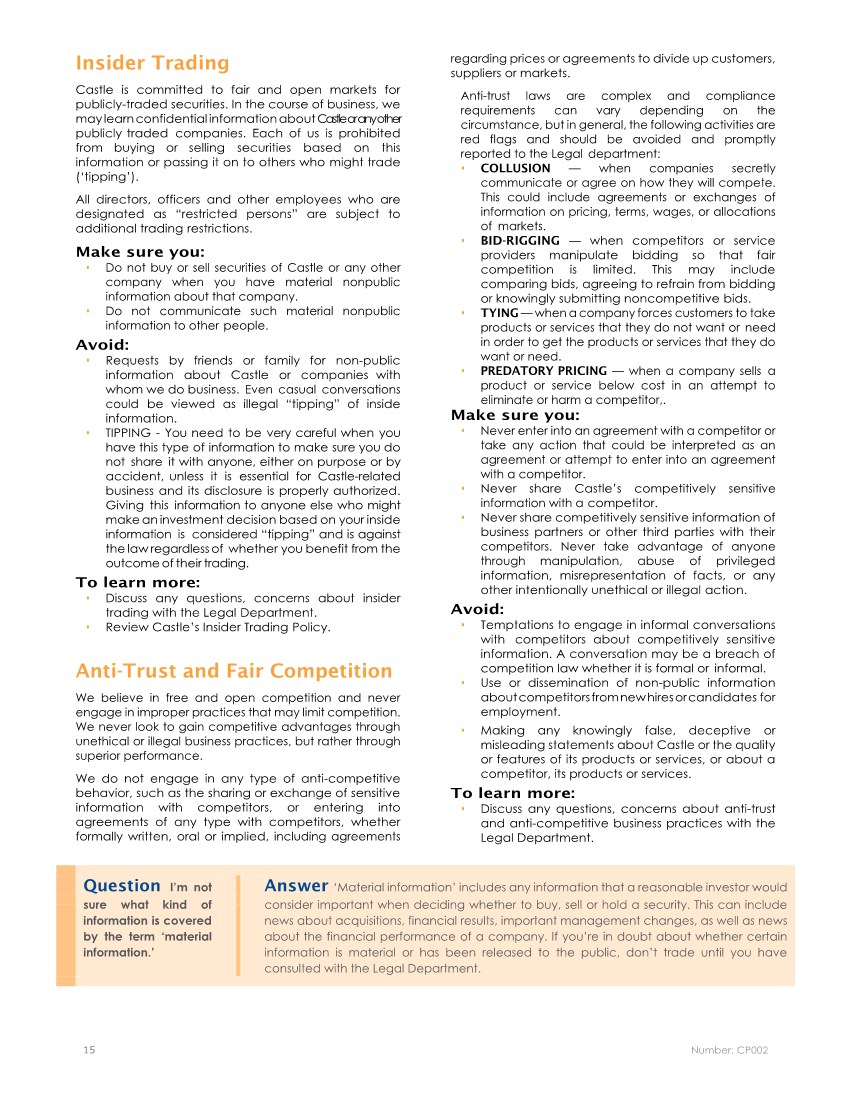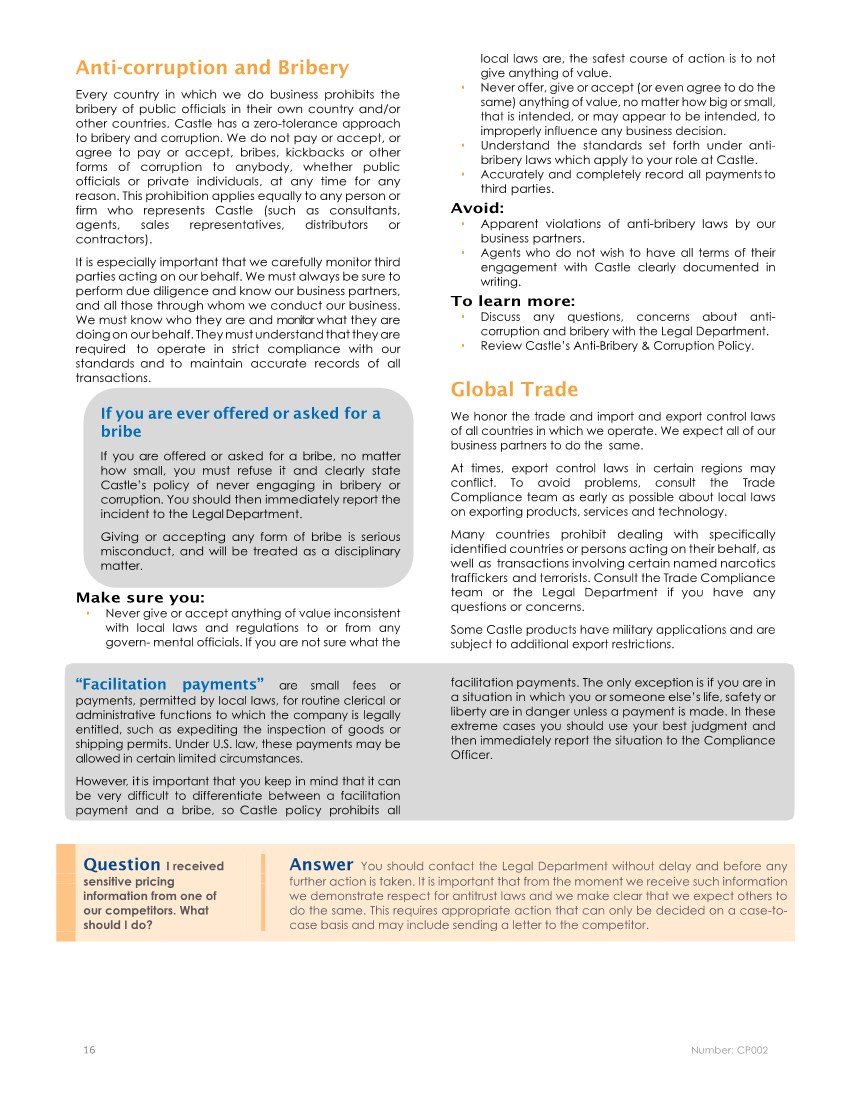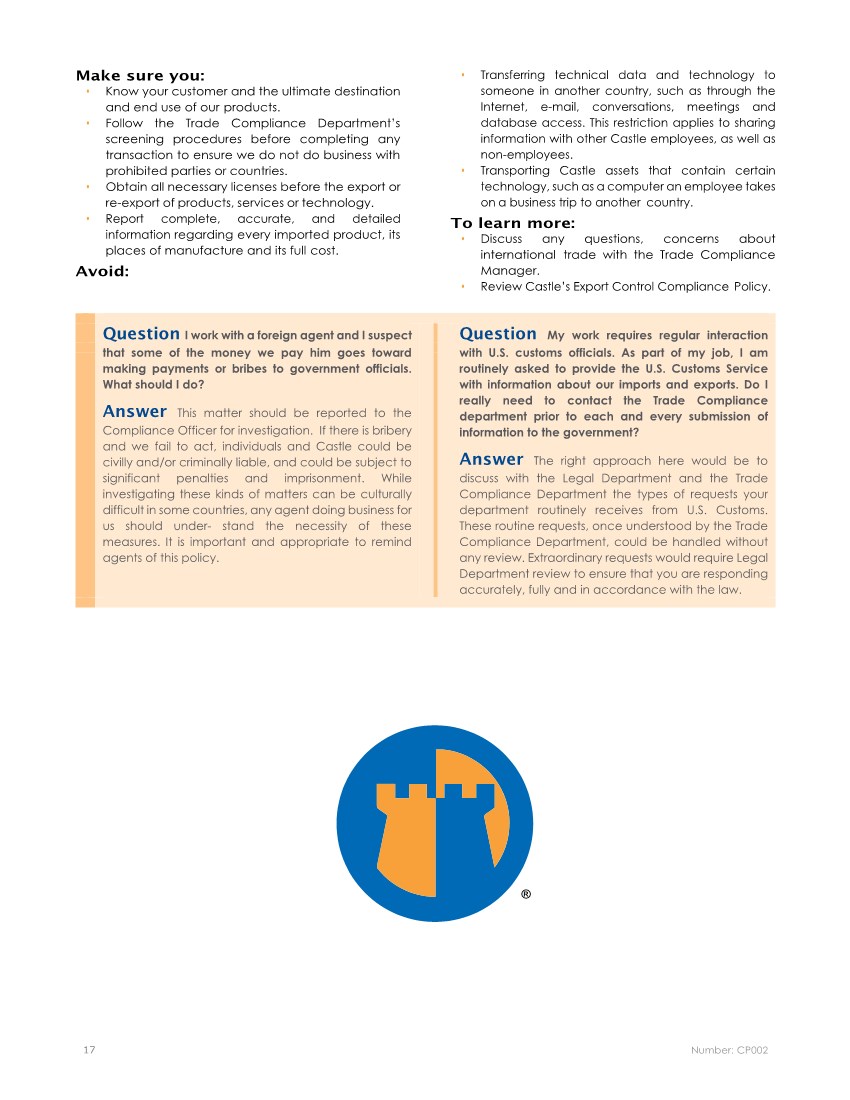Attached files
| file | filename |
|---|---|
| EX-32.1 - EX-32.1 - A. M. Castle & Co. | tmb-20201231xex32d1.htm |
| EX-31.2 - EX-31.2 - A. M. Castle & Co. | tmb-20201231xex31d2.htm |
| EX-31.1 - EX-31.1 - A. M. Castle & Co. | tmb-20201231xex31d1.htm |
| EX-22.1 - EX-22.1 - A. M. Castle & Co. | tmb-20201231xex22d1.htm |
| EX-21.1 - EX-21.1 - A. M. Castle & Co. | tmb-20201231xex21d1.htm |
| EX-4.4 - EX-4.4 - A. M. Castle & Co. | tmb-20201231xex4d4.htm |
| 10-K - 10-K - A. M. Castle & Co. | tmb-20201231x10k.htm |
Exhibit 14.1
| Our Success Depends on Each of Us CODE OF CONDUCT ® |
|
|
| A Message from Marec E. Edgar Castle Team, We are living in a complex, rapidly-evolving time in history. The world is smaller and more connected than it has ever been, but at the same time polarized to a greater degree than in recent memory. In such complicated times, our long-term success as a business is dependent on many operational factors, including strategic vision, inspired teamwork at all levels of the organization, world-class products, and customer-centric service. But, more than ever, our success is also dependent on our reputation in the marketplace for honesty, integrity, and good corporate citizenship. Our ethical standards reflect and define us as a Company and as individuals. Our reputation for integrity is—and must always be—the cornerstone of our business. At Castle, we “do what we say we will do,” even when difficult. With that as our guiding principle, we are fully committed to abide by both the letter and the spirit of the policies, principles, and laws referenced in this Code of Conduct. We seek to exceed the expectations of our customers and business partners, the communities in which we work and live, and each other by seeking to do not only what is legal, but also what is right. Such commitment inspires confidence in those with whom we work, shows them that we share common goals, and yields mutually beneficial long-term relationships of trust. While there is no substitute for sound business and personal judgment, the principles outlined in our Code should assist and guide you in your pursuits and efforts on behalf of our Company. Our Code cannot answer all of your questions or address every situation, but we always have resources available to assist with questions or concerns. If you have questions, or have doubts or concerns about possible violations, seek assistance or report your concerns. Rest assured that any report will be taken seriously and you can do your part without fear of retaliation. In the end, if something does not feel right, please speak up. Each of us is accountable to our entire team for doing right and holding our teammates to the same standard. In that spirit, I have made a personal commitment to adhere to both the letter and the spirit of the principles and guidelines discussed in our Code, and I ask each of you to do the same. Always remember that business results and strategic goals and objectives are never more important than, and must never be allowed to overtake, our personal and corporate standards of ethics and business conduct. This is true without exception, every day, throughout the world. Thank you for your continued commitment to Castle and to the principles for which it stands. We have built a company of which we can be proud and, together, we will keep it that way. Sincerely, Marec E. Edgar President & CEO August 2020 |
| i Number: CP002 Table of Contents Our Commitment to Ethics and Compliance 1 How to Use this Code 1 To Whom this Code Applies 1 Compliance Officer 1 Reporting Misconduct, Asking Questions and Using the Incident Reporting Hotline 1 Employee Responsibilities 2 Cooperating with Investigations 2 Making the Right Choice 3 Accountability and Discipline 3 Waivers and Exceptions 3 Maintaining Respect and Integrity in Our Work Environment 4 Diversity and Non-Discrimination 4 Harassment-Free Workplace 4 Protecting the Private Information of Others 5 Safe and Healthy Work Environment 6 Working With Our Customers and Business Partners 7 Fair Dealing 7 Conflicts of Interest 7 Gifts and Entertainment 8 Supplier Relations 9 Government Contracting 10 Protecting Our Information and Assets 11 Protecting Castle’s Assets 11 Confidential Company Information 11 Creating and Managing Our Business Records 12 Communicating with the Public 12 Using Social Media 13 Following the Letter and the Spirit of Law 14 Corporate Social Responsibility 14 Political Activities 14 Insider Trading 15 Anti-Trust and Fair Competition 15 Anti-Corruption and Bribery 16 Global Trade 16 |
| 1 Number: CP002 Our Commitment to Ethics and Compliance The strength of A.M. Castle & Co. is measured by more than financial or operational success; it is also measured by our commitment to each other, to our business partners, and to the communities where we work and live. We take pride in operating our business with Integrity, which, along with Safety, is the first of Our Values. Integrity means doing the right thing. It is the foundation of our success. As individuals, our personal integrity means that others can trust and respect us and know that we will be honest, fair and forthright. As a company, integrity means that we will always honor our commitments and be a reliable business partner and trusted neighbor. Integrity protects our reputation and enables us to thrive, even in today’s complex and competitive business environment. We believe that integrity is a critical factor in our long-term success. How to Use This Code Our Code of Conduct (“Code”) is designed to help when you have questions about what to do in specific situations. It is a summary of how we will do business in accordance with our values, policies, and various laws and regulations. This Code is designed to serve as a resource when you are faced with a difficult ethical situation. It is impossible to anticipate every question you may have or situation you might face so, in addition to this Code, Castle also has other resources that may be of help. These additional resources are listed throughout this Code. As always, Castle relies on you to use good judgment and to seek help when you need it. To Whom this Code Applies This Code applies to everyone working at Castle including all employees whether permanent, fixed-term or temporary. Certain business partners, such as agents, consultants, contractors, trainees and others serve as an extension of Castle. They are expected to follow the spirit of this Code, as well as any applicable contractual provisions, when working on behalf of Castle. Managers who supervise our business partners are responsible for ensuring that they understand our ethical standards. If an external business partner fails to comply with our ethics and compliance expectations and their related contractual obligations, it may result in the termination of their contract. Compliance Officer Castle’s Compliance Officer is the member of our management team with primary responsible for implementing and enforcing our Compliance Program. Our Compliance Officer is the appointed Chief Compliance Officer (if any) or General Counsel, or any other officer assigned such responsibilities by our Board of Directors or CEO. Reporting Misconduct, Asking Questions and Using the Incident Reporting Hotline If you see or suspect any illegal or unethical behavior, or you have a question about what to do, talk to your manager and ask for help. Sometimes, you may not feel comfortable or may not feel it appropriate to talk about an issue with your manager. If that’s the case, you have several options. You may contact another manager, your Human Resources Manager or a member of the Legal Department. At all times, and for any type of concern, you also have the option to call Castle’s anonymous and confidential Incident Reporting Hotline at 800-461-9330 or to make a report via the internet at www.convercent.com/report. Castle will make every reasonable attempt to ensure that your concerns are addressed appropriately. Question Our manager typically does nothing when concerns about potential misconduct are brought to her attention and I believe she makes things difficult for co- workers who raise issues. Now I have a problem. A co- worker is doing something that I believe to be ethically wrong. What should I do? Answer Take action and speak up. Starting with your manager is often the best way to efficiently address concerns. However, if you do not believe that it is appropriate or do not feel comfortable doing so, you should talk to another member of management, or any of the resources listed in this Code. Question What if someone misuses the Incident Reporting Hotline, and falsely accuses someone of wrongdoing? Answer Experience has shown that the Incident Reporting Hotline is rarely used for malicious purposes, but it is important to know that we follow up on all calls and anyone who uses the Hotline in bad faith to spread falsehoods or threaten others, or with the intent to unjustly damage another person’s reputation, will be subject to disciplinary action up to and including termination. It is important to note, however, that disciplinary action will not be taken against someone who, in good faith, reports suspected misconduct, even if the suspicions prove to have been wrong. . |
| 2 Number: CP002 What to expect when you use the Incident Reporting Hotline The Incident Reporting Hotline is available 24 hours, seven days a week. Trained specialists from an independent third party provider will answer your call, document your concerns and forward a written report to Castle’s Compliance Officer, for further investigation. When you contact Castle’s Incident Reporting Hotline you may choose to remain anonymous where allowed by local law. All reports will be treated equally whether they are submitted anonymously or not. After you make a report, you will receive an identification number so you can follow up on your concern. Following up is especially important if you have submitted a report anonymously, as we may need additional information in order to conduct an effective investigation. This identification number will also enable you to track the resolution of the case; however please note that, out of respect for privacy, Castle will not be able to inform you about individual disciplinary actions. Any report you make will be kept as confidential as possible by all individuals responsible for reviewing and investigating the matter, although limited disclosure may be needed to properly investigate and take corrective action. Castle has an opportunity to improve every time you ask a question or raise a concern. When you take action, speak up and report questionable conduct, you are protecting your colleagues and our reputation. Remember, an issue cannot be addressed unless it is brought to someone’s attention. Our Non-Retaliation Policy You can report ethical violations in confidence and without fear of retaliation. Castle will not tolerate any retaliation against an employee who asks questions, makes reports of possible violations of our Code or policies, assists in an investigation of suspected wrongdoing or refuses to engage in conduct or activity believed to be illegal or unethical. Employee Responsibilities Each of us must take responsibility for acting in accordance with our Mission, Vision and Values and with our Code, even when this means making difficult choices. Meeting our responsibilities is what enables us to succeed and grow, today – and in the future. • Always act in a professional, honest, and ethical manner when acting on behalf of Castle. • Know the information in our Code as well as Castle’s policies and procedures, paying particular attention to the topics that pertain to your job responsibilities. • Be a resource for others. Be proactive. Look for opportunities to discuss and address ethics and challenging situations with others. • Help create an environment where everyone feels comfortable asking questions and reporting potential violations of our Code and policies. Respond quickly and effectively to concerns that are brought to your attention. • If you supervise third parties, ensure that they understand their ethics and compliance obligations. Remember: no reason, including the desire to meet business goals, should ever be an excuse for violating laws, regulations, our Code or Castle’s policies. Cooperating with Investigations All employees are required to cooperate fully and truthfully with investigations. With respect to inquiries from regulators and inspectors, we must never mislead them and never alter or destroy documents or records in response to an investigation. All requests for information by regulatory authority or government agency, other than what is provided on a routine basis, should be reported to the Compliance Officer immediately. When we are notified of an external investigation, we will take prompt action to preserve documents that may be relevant. Question I suspect there may be some unethical behavior going on in my branch involving my manager. I know I should report my suspicions, and I’m thinking about using the Incident Reporting Hotline, but I’m concerned about retaliation. Answer After you make the report, if you believe you are experiencing any retaliation, you should report it. We take claims of retaliation seriously. Reports of retaliation will be thoroughly investigated and, if they are true, retaliators will be disciplined up to and including termination. Question I’m a manager and I’m not clear what my obligations are if someone comes to me with an accusation – and what if it involves a senior leader? Answer No matter who the allegation involves, you must take the matter seriously and promptly report it without exception. Castle provides several avenues for reporting concerns. If for any reason you are uncomfortable making a report to a particular person, you may talk to any of the other resources listed in this Code or another member of management. |
| 3 Number: CP002 Making the Right Choice Guidelines for Ethical Decision- making Making the right decision is not always easy. There will be times when you’ll be under pressure or unsure of what to do. Always remember when you have a tough choice to make, you’re not alone. Your colleagues and management are available to help, and you have other resources to turn to including our Code, our policies, your colleagues, and the Incident Reporting Hotline. When faced with a tough decision, it may help to ask these questions: • Is it legal? • Is it consistent with Our Mission, Vision and Values, this Code and policies? • Is it based on a thorough understanding of the risks involved? • Will I be able to look myself in the mirror and be proud of the decision? • Would I still be comfortable with the decision if it appeared in the newspaper or on the internet? If the answer to any of these questions is no, stop and ask for guidance. Accountability and Discipline Violating relevant laws, regulations or our Code, or encouraging others to do so, exposes individuals and Castle to liability and puts Castle’s reputation at risk. Violations of laws or regulations may result in legal proceedings and penalties including, in some circumstances, criminal prosecution. Any such violations may result in disciplinary action, up to and including termination of employment. Waivers and Exceptions In limited circumstances, Castle may find it necessary to waive a provision of our Code; however we generally will not grant such waivers and will make exceptions only for good cause. Any waiver of any provision of this Code for employees, up to the director level, must be approved in writing by the Compliance Officer. All waivers must be promptly disclosed as required by law. Question I’m a manager. If I observe misconduct in an area not under my supervision, am I still required to report the issue? Answer You are chiefly responsible for employees, contractors and third parties under your supervision, but as a leader you are especially obliged to take action. The best approach is to talk first with the manager who oversees the area where the problem is occurring, but if this doesn’t work, or isn’t feasible, you should use other resources listed in this Code. p Question I just learned that a good friend of mine at work has been accused of sexual harassment and that an investigation is being launched. I can’t believe it’s true and I think it’s only fair that I give my friend an advance warning or a ‘heads up’ so he can defend himself. Don’t I have a responsibility as a friend to tell him? Answer Under no circumstances should you give him a ‘heads up.’ Your friend will be given the opportunity to respond to these allegations and every effort will be made to conduct a fair and impartial investigation. An allegation of sexual harassment is a very serious matter with implications not only for the individuals involved but also for Castle. Alerting your friend could jeopardize the investigation and expose Castle to additional risk and possible costs. Question My branch sets various goals that we are asked to achieve. Sometimes I feel pressured to violate our Code and policies to achieve these goals. Is this acceptable? Answer No. While successful businesses set high goals and employees strive to achieve them, you should never violate our Code or Castle’s policies to achieve your goals. |
| 4 Number: CP002 Maintaining Respect and Integrity in Our Work Environment We owe each other honesty, respect and fair treatment and we need to always treat others as we would want to be treated. This is the basis of our commitment to one another and is the foundation of our success. To maintain our commitment and to attract and keep talented individuals, it is vital that we continue to have a supportive, professional and respectful work environment. Maintaining this environment not only helps Castle succeed, it also creates a setting where each of us can thrive and reach our full potential. What follows are some of the key areas where we must be guided by our commitment to Our Mission, Vision, and Values. Diversity and Non-Discrimination Castle brings together employees with a wide variety of backgrounds, skills and cultures. Combining such a wealth of talent and resources creates the diverse and dynamic teams that consistently drive our results. Our colleagues, job applicants and business partners are entitled to respect and should be judged on the basis of their qualifications, demonstrated skills and achievements. We will not tolerate any form of discrimination, whether based on a person’s race, color, religion, national origin, gender, pregnancy, sexual orientation, age, disability, veteran status or any other characteristics protected by law. Make sure you: • Treat others respectfully and professionally. • Promote diversity in hiring and other employment decisions. • Do not discriminate against others on the basis of any characteristic protected by law or Castle’s policies. Avoid: • Comments, jokes or materials, including emails, which others might consider offensive. • Inappropriate bias when judging others. If you supervise others, judge them on performance. Avoid introducing unrelated considerations into your decisions. Use objective, quantifiable standards. To learn more: • Discuss any questions, concerns about diversity and equal opportunity with your Human Resources Manager or the Legal Department. • Review Castle’s Employee Handbook. Harassment-Free Workplace We all have the right to work in an environment that is free from intimidation, harassment, bullying and abuse. Verbal or physical conduct by any employee that harasses another, disrupts another’s work performance, or creates an intimidating, offensive, abusive, or hostile work environment will not be tolerated. At Castle we do not tolerate: • Threatening remarks, obscene phone calls, stalking or any other form of harassment. • Causing or threatening physical injury to another. • Intentionally damaging someone else’s property or acting aggressively in a manner that causes someone else to fear injury. • Threatening, intimidating or coercing others on or off the premises -- at any time, for any purpose. In particular, we have zero tolerance for sexual harassment, which in general occurs when: • Actions that are unwelcome and are made a condition of employment or used as the basis for employment decisions such as a request for a date, a sexual favor, or other similar conduct of a sexual nature. • An intimidating, offensive, or hostile work environment is created by unwelcome sexual advances, insulting jokes, inappropriate or pornographic materials, or other offensive verbal or physical behavior of a sexual nature. Question One of my co-workers sends e-mails containing jokes and derogatory comments about certain nationalities. They make me uncomfortable, but no one else has spoken up about them. What should I do? Answer You should notify your immediate manager or Human Resources Manager. Sending such jokes violates our values as well as our policies pertaining to the use of e-mail and our standards on diversity, harassment and discrimination. You can also report the matter through Castle’s Incident Reporting Hotline. By not “speaking up,” you are condoning discrimination and tolerating beliefs that can seriously erode the team environment that we have all worked to create. |
| 5 Number: CP002 Make sure you: • Help each other by speaking out when a co- worker’s conduct makes others uncomfortable. • Never tolerate sexual harassment including requests for sexual favors, or other unwelcome verbal or physical conduct of a sexual nature. • Demonstrate professionalism. Do not visit inappropriate internet sites or display sexually explicit or offensive pictures. • Promote a positive attitude toward policies designed to build a safe, ethical and professional workplace. • Report all incidents of harassment and intimidation that may compromise our ability to work together and be productive. Avoid: • Unwelcome remarks, gestures or physical contact. • The display of sexually explicit or offensive pictures or other materials • Sexual or offensive jokes or comments (explicit or by innuendo) and leering. • Verbal abuse, threats or taunting. To learn more: • Discuss any questions or concerns about our workplace harassment with your Human Resources Manager or the Legal Department. • Review the Employee Handbook. Protecting the Private Information of Others In recent years, individuals, companies and governments have grown increasingly concerned about the privacy and security of personal information. As a result, laws protecting personal information and how it may be collected, shared, and used are becoming more common. Many of us have access to personal information related to our colleagues and others. While protecting this information may now be a legal requirement, for Castle, privacy has always been a matter of trust. Make sure you: • Learn about the types of information which are given heightened protection by the law and Castle’s policy (such as Sensitive Personal Information including government issued identity numbers and bank account numbers) and protect them through appropriate means (such as encryption or other types of limited access). • Protect the confidentiality of personal information of current and former colleagues, as well as job applicants, business partners and customers. • Never share colleagues’ information outside of Castle, except as expressly authorized. • Don’t access, discuss or share confidential information unless there is a legitimate business reason to do so. • Consult the Legal Department if law enforcement or regulatory authority or any other person outside Castle requests employee information. • Return or destroy personal information that is no longer required by you for business reasons in accordance with our records retention policies. • Only share confidential employee information within Castle if you are authorized to do so and have made sure it will be appropriately protected. • Immediately report to a manager any theft, loss, unauthorized access or inadvertent disclosure of employee information. Avoid: • Unintentional exposure of confidential information in public settings such as on phone calls or while working on your laptop. • The loss of control of confidential information. When sending personal information across borders or to third parties, make sure that the transmissions are for legitimate business reasons and that they comply with local law and our policies. To learn more • Discuss any questions, concerns about employee privacy and confidential information with the Legal Department. • Review Castle’s Global Privacy Policy. Question While on a business trip, a colleague of mine repeatedly asked me out for drinks and made comments about my appearance that made me uncomfortable. I asked him to stop, but he wouldn’t. We weren’t in the office and it was ‘after hours’ so I wasn’t sure what I should do. Is it harassment? Answer Yes it is. This type of conduct is not tolerated, not only during working hours but in all work-related situations including business trips. Tell your colleague such actions are inappropriate and must be stopped, and if they continue you need to report the problem. |
| 6 Number: CP002 Safe and Healthy Work Environment Castle is committed to providing a safe and healthy work environment for colleagues and visitors and to avoiding adverse impact and injury to the environment and the communities in which we do business. Each of us is responsible for acting in a way that protects ourselves, others and the environment. Because of the nature of our business, a robust environmental, health & safety (“EH&S”) compliance structure exists to comply with the many regulations that apply. Each of us plays an important role in ensuring Castle meets these demanding requirements. Be proactive and speak up if you hear of or see something that you suspect might not be in line with our obligations or policies. The more we communicate, the better we can respond to any unsafe or unhealthy working conditions. Situations that may pose a health, safety or environmental hazard must be reported immediately using Castle’s Incident Reporting Hotline or any of the resources listed in this Code. We can only achieve our goal of a safe and healthy workplace through the active participation and support of everyone. Make sure you: • Observe all applicable safety and environmental regulations and the safety and security rules and practices that apply to your job. • Always display and swipe your personal identification badge when entering and exiting secure areas and do not allow others to enter without properly swiping their personal identification badges. • Respect the environmental rights and interests of our neighbors and the communities in which we operate. • Report all concerns to Castle’s dedicated EH&S professionals, the EH&S’ Oracle platform, the Legal Department or any of the resources listed in this Code. Avoid: • Unsafe practices or work conditions. • Lax enforcement of security standards, such as facility entry procedures and password protocols. To learn more: • Discuss any questions, concerns about environmental, health and safety with our Corporate Director of EH&S or the Legal Department. • Review Castle’s Environmental Health & Safety Policy. Preventing Workplace Violence • Violence of any kind has no place at Castle. We will not tolerate the following: • Intimidating, threatening or hostile behavior. • Causing physical injury to another. • Acts of vandalism, arson, sabotage or other criminal activities. • The carrying of weapons onto Castle property. • Offensive comments regarding violent events or behavior. Alcohol and drug-use • Our position here is clear. While at work or on Castle business, you should never be impaired, and always ready to carry out your work duties. • While conducting Castle business, do not use, possess or be under the influence of illegal drugs or any substance that could interfere with a safe and effective work environment or harm Castle’s reputation. Question I’ve noticed some practices that we do in my area that don’t seem safe. Who can I speak to? I’m new here, and don’t want to be considered a troublemaker. Answer Discuss your concerns with your manager or our Safety Director. There may be very good reasons for the practices, but it’s important to remember that raising a concern about safety does not cause trouble, it is being responsible. Question Are subcontractors expected to follow the same health, safety and security policies and procedures as employees? Answer Absolutely. Castle employees are responsible for ensuring that subcontractors and vendors at work on Castle premises understand and comply with all applicable laws, and regulations governing the particular facility, as well as with additional requirements Castle may impose. |
| 7 Number: CP002 Working with Our Customers and Business Partners Fair Dealing We treat our customers and business partners fairly. We work to understand and meet their needs, while always remaining true to our own ethical standards. We tell the truth about our services and capabilities and we do not make promises we can’t keep. You should deal honestly and in good faith with our customers, shareholders, suppliers, regulators, business partners, competitors and others. Never take unfair advantage through manipulation, concealment, abuse of privileged or confidential information, misrepresentation, fraudulent behavior, or any other unfair practice. In short, treat others as you would like to be treated. Make sure you: • Treat each customer fairly and honestly. • Never follow a customer’s request to do something that you regard as unethical or unlawful. • Be responsive to customer requests and questions. • Promise what you can deliver and deliver on what you promise. Avoid: • Pressures from colleagues or managers to cut corners on quality or delivery standards. • Temptations to tell customers what you think they want to hear rather than the truth; if a situation is unclear begin by presenting a fair and accurate picture as a basis for decision. To learn more • Discuss any questions or concerns about our products or customer service with your manager or a member of the senior leadership team. Conflicts of Interest A conflict of interest happens whenever you have a competing interest that may interfere with your ability to make an objective and effective decision for Castle. Conflicts of interest may also arise if you or a family member receives an undisclosed personal benefit as a result of business dealings with Castle as well as your position with Castle. Each of us is expected to use good judgment and avoid situations that can lead to even the appearance of a conflict, which can undermine the trust others place in us and damage our reputation. Conflicts of interest may be actual, potential or even just a matter of perception. Since these situations are not always clear-cut, you need to fully disclose them to your manager or the Legal Department so that we can properly evaluate, monitor and manage them. Depending on the circumstances, these business dealings may be permitted if properly disclosed by you and appropriately managed by Castle management. Make sure you: • Avoid conflict of interest situations whenever possible. • Always make business decisions in the best interest of Castle. Disclose any relationship, outside activity, or financial interest that may present a possible conflict of interest or the appearance of a conflict. Make your disclosures in writing to your manager as well as to Castle’s Compliance Officer. • Think ahead and proactively address situations that may put your interests or those of a family member in potential conflict with Castle. Avoid: Situations, including the following, which are common examples of potential conflicts of interest: Corporate opportunities If you learn about a business opportunity because of your job, it belongs to Castle first. Castle employees may not take for themselves, or direct to any family member or friend, opportunities that are discovered on the job. Friends and relatives On occasion, it is possible that you may find yourself in a situation where you are working with a close friend or relative who works for a customer, supplier, competitor, etc. Since it is impossible to anticipate all situations that may create a potential conflict, you should disclose your situation to your manager or the Legal Department in order to determine if any precautions need to be taken. At all times, you should avoid recommending or using your position to influence the use of a supplier if you or a member of your immediate family would receive an undisclosed personal benefit as a result of your recommendation. Personal work You must never hire employees over whom you have direct supervisory responsibility for outside work that is of personal benefit to you and is unrelated to their work for Castle. |
| 8 Number: CP002 Outside employment To ensure that there are no conflicts and that potential issues are addressed, you always need to disclose and discuss outside employment to your manager and the Legal Department. If approved, you need to ensure that this outside activity does not interfere or detract from your work or would subject Castle to criticism. Also, any approved side or personal business should not compete with Castle or do any business with Castle without prior approval by the Compliance Officer. Personal investments You should not have substantial investment in, or obligation to, one of Castle’s customers, suppliers or competitors unless the security is publicly traded on a national exchange and there is no possibility for a conflict. “Substantial” is hard to define, but as a rule of thumb, it means that your investment should not be big enough for someone to reasonably think that you would do something at Castle’s expense to help your investment. Civic and political activities Volunteer work and participation in civic organizations is encouraged. You have the right to voluntarily participate in the political process including making personal political contributions. However, you must always make it clear that your personal views and actions are not those of Castle. In addition, you must never use Castle funds, assets or resources to support any political candidate or party unless specifically permitted by law and authorized by the Compliance Officer. To learn more • Discuss any questions, concerns about conflicts of interest with the Legal Department. Gifts and Entertainment In the right circumstances, a modest holiday gift may be a thoughtful “thank you,” or a meal may be an appropriate setting for a business discussion which strengthens a professional relationship. However, if not handled carefully, the exchange of gifts and entertainment can look like a conflict of interest or a bribe, especially if it happens frequently or if the value is large enough that someone could reasonably think it is influencing a business decision. When it comes to gifts and entertainment, our position is clear – we do not give or offer any gift that is intended, or that may appear to be intended, to gain an improper advantage in selling goods or services, conducting transactions or representing Castle’s interests. Gifts and entertainment, before you act – think Gifts and entertainment come in all different forms: fruit baskets, dinners, tickets to sporting events, to name just a few examples. Before you accept or offer gifts or entertainment, think about the situation – does it legitimately support Castle’s interest? Is the amount reasonable and customary? Does it conform to Castle’s Gift & Hospitality Policy and the Anti-Bribery & Corruption Pollicy? Would this embarrass you or Castle if it was on the front page of the newspaper or on the internet? Make sure you: • Obtain approval when giving or receiving gifts or entertainment if the value exceeds the equivalent of $25 for gifts, $100 for entertainment, or $75 per person for meals. It would be advisable to respectfully decline gifts and entertainment of anything more than nominal value unless cultural or similar considerations would make it offensive or difficult to do so. • Only provide and accept gifts and entertainment that are reasonable complements to business relationships. • Never accept gifts of any kind from, or give gifts to, a business partner with whom you are involved in contract negotiations. • Do not request or solicit personal gifts, favors, entertainment or services. • Never accept gifts of cash or cash equivalents (i.e., gift cards). Question When I was traveling, I received a gift from a business partner that I believe was excessive. What should I do? Answer You need to let your manager know or report it to the Internal Audit or Legal Departments as soon as possible. We may need to return the gift with a letter explaining our policy. If a gift is perishable or impractical to return, another option may be to distribute it to employees or donate it to charity, with a letter of explanation to the donor. |
| 9 Number: CP002 • Understand and comply with the policies of the recipient’s organization before offering or providing gifts, favors or entertainment. • Be careful when using agents who represent us or third parties who introduce business partners to us. Monitor them during the duration of any agreement to ensure they live up to our standards. Avoid: • Situations that could embarrass you or Castle, including entertainment at sexually oriented establishments. • Business partners or customers who may have gift and entertainment standards that are more strict than ours. • Business partners that appear to be privately held but are actually considered government entities. • Requests to provide gifts or entertainment in secret, or “off the books.” • Third parties or agents who are thought to be valuable primarily for their personal ties rather than for the services they are to perform or who request compensation out of proportion to their services. To learn more: • Discuss any questions, concerns about gifts and entertainment with the Legal Department or Internal Audit Department. • Castle’s Gift & Hospitality Policy and Anti-Bribery & Corruption Policy. Supplier Relations We deal fairly with our suppliers, and we expect them to act with integrity. In dealings with Castle, we expect suppliers to follow the spirit of our Code, as well as any applicable contractual provisions, when working on our behalf. Make sure you: • Consider both value and industry standards when choosing suppliers. • Properly document all payments, such as in a negotiated agreement or adequately detailed invoice, setting forth the nature and purpose of the transaction. • Only make payments to the business entity listed on the original sales agreement or sales invoice and only in accordance with the payment terms as defined in the sales agreement or invoice. • Charge all payments to the business entity or project benefitting from the payment. Do not charge payments to unrelated accounts. • Only sign off on transactions once you fully under- stand them and are certain that they comply with Castle’s policies. Avoid: • Suppliers pressing for cash payments. With a very few exceptions, Castle makes all payments by check, bank order, or credit note. When cash payments are necessary, work with the proper parties to ensure that all requisite safeguards are in place, and make sure that the payment is properly documented. • Suppliers who request that payments be made to an individual or who provide unusual payment or routing instructions. Payments should only be made to the business entity listed in the sales agreement or on the invoice, or to their place of business and bank account. • Illegal or unethical payments. We must comply with applicable currency exchange and tax regulations. To learn more: • Discuss any questions or concerns about supplier relations with the Legal Department. Question During contract negotiations with a potential new supplier, the new supplier mentioned that they had a complimentary registration to a local business seminar. They are unable to attend and asked if I would like to go in their place. I had been thinking of attending the seminar anyhow, since the subject of the seminar applies to my work. There’s no personal gain to me, it would be good for Castle, and it would be a shame to waste the registration, I planned on saying ‘yes.’ Now I wonder if that would be the right decision. Answer You should decline the offer. If you are involved in contract negotiations, you must never accept any gifts while the negotiation process is on-going. Accepting gifts during negotiations can give the appearance of a ‘quid pro quo’ and is always inappropriate. Gifts and entertainment of government representatives Particular attention needs to be paid to situations involving government officials. Never provide gifts or entertainment to government officials, government employees or employees of government-owned companies without approval of the Compliance Officer. Take care as it is not always obvious what is considered government-owned or government-related. Businesses such as airlines, oil companies and telecommunications providers may be owned or controlled by a government, in whole or in part, and subject to special laws and regulations. When in doubt, discuss the situation with your manager or the Legal Department. |
| 10 Number: CP002 Government Contracting Castle conducts business with governments and government-owned entities. Our policy is to comply fully with all applicable laws and regulations that apply to government contracting and transactions. Leaders who oversee work with governments and government-owned entities must remain up-to-date on relevant regulations and should contact the Legal Department with any questions. Special care should be taken to ensure that any third party who, while acting on behalf of Castle, provides goods or services on government projects, is aware of and abides by our high standards and their contractual obligations. Government contracting regulations can be complex, but despite this complexity, there are a number of principles that are fundamental and apply to all employees when bidding, pricing, negotiating, and performing government contracts, including when acting as a subcontractor or when making sales to other government contractors: • Never make or cause to be made to the government a false or fraudulent statement or a false claim for payment, whether orally or in writing. This includes bids, proposals, and requests for payment. The pricing and other terms established for a particular government contract should be followed for that contract. • Never provide anything of value to a government employee, even meals or other incidentals. Government employees are subject to strict rules which basically require them to pay for their own expenses with limited exceptions. • Always use legitimate methods to obtain a contract. Never seek or receive information that Castle is not authorized to possess, including, but not limited to, confidential or proprietary data, pricing information of other competitors for government contracts, and non-public government documents relating to bidding or source selection. • Always comply with federal and state conflict of interest restrictions which make it illegal for former government officials or employees to represent, aid, or advise Castle on governmental matters in which the former official or employee had some governmental responsibility or involvement. No former government official or employee may be hired or retained by Castle in any capacity without the prior review and approval of the Compliance Officer. |
| 11 Number: CP002 Protecting Our Information and Assets Protecting Castle’s Assets We are entrusted with Castle’s assets and are personally responsible for protecting them and using them with care. Castle’s assets include information, materials, supplies, time, intellectual property, software, hardware and facilities. Castle reserves the right to monitor use of Castle property (including computers, e-mail and phones) in accordance with applicable law. Make sure you: • Treat Castle’s assets the way you would take care of your own property. • Personal use of Castle’s assets – including electronic media such as phones and email - is permitted in limited circumstances. Such use should be kept to a minimum and have no adverse effect on productivity and the work environment. • Do not use Castle equipment or information systems to create, store or send content that others might find offensive. • Respect the copyrights, trademarks and license agreements of others when dealing with printed or electronic materials, software or other media content. Avoid: • Borrowing or using Castle equipment for personal or non- Castle business purposes without approval. • Lax enforcement of electronic access control cards. • Sharing passwords. To learn more: • Discuss any questions, concerns about protecting Castle assets with the IT department. • Review the Information Technology Policies. Confidential Company Information Each of us must be vigilant and protect Castle’s confidential information. This means keeping it secure, limiting access to those who have a need to know in order to do their job and avoiding discussion of confidential information in public areas. Many of us have access to confidential information related to our colleagues, our customers and our business partners. We must protect their confidential information. You have an obligation to keep confidential any information acquired with respect to present, past or prospective customers, suppliers, shareholders, and other employees. The obligation to preserve confidential information continues even after employment ends. In addition to protecting Castle’s intellectual property rights, Castle respects the valid intellectual property rights of others. Unauthorized use of the proprietary information or intellectual property rights of others may expose Castle to civil law suits and damages. In many countries, theft and misappropriation of trade secrets, proprietary information, or other intellectual property may result in significant fines and criminal penalties to both Castle and to the individual. Make sure you: • Don’t access, discuss or share confidential information unless there is a legitimate and authorized business reason to do so. • Protect intellectual property and confidential information by sharing it only with authorized parties. • Obtain competitive information only through legal and ethical means, never through misrepresentation, or through any behavior that could be construed as “espionage”, “spying” or which you would not be willing to fully disclose. • Immediately inform your manager and the Legal Department of any theft, unauthorized access or loss of confidential information. Question One of my co-workers, who recently joined Castle from a competitor has with her a customer list and price list of the competitor. She says she plans to use it to our advantage. Should I just ignore this and let her do it? Answer No. If an employee retains competitor information it can result in legal action by the competitor and is a violation of our ethical standards. You must report this to the Compliance Officer for appropriate action. |
| 12 Number: CP002 Avoid: • Unintentional exposure of confidential information in public settings such as on phone calls or while working on your laptop. • The loss of control of confidential information. When sending personal information across borders or to third parties, make sure that the transmissions are for legitimate business reasons and that they comply with local law. To learn more: • Discuss any questions, concerns about confidential information with the Legal Department. • Review Castle’s Global Privacy Policy. Creating and Managing Our Business Records Business partners, government officials and the public need to be able to rely on the accuracy and completeness of our disclosures and business records. Accurate information is also essential within Castle so that we can make good decisions. Our books and records must accurately and fairly reflect our transactions in reasonable detail and in accordance with our accounting practices and policies. Employees with a role in financial or operational recording or reporting have a special responsibility in this area, but all of us contribute to the process of recording business results and maintaining records. Each of us is responsible for helping to ensure the information we record is accurate and complete and maintained in a manner that is consistent with our system of internal controls. If you suspect any fraud or irregularity relating to the integrity of our records, you need to report it immediately to the Internal Audit Department, or through the Incident Reporting Hotline. Make sure you: • Create accounting and business records that accurately reflect the truth of the underlying event or transaction. • Record transactions as prescribed by our system of internal controls. • Write carefully and clearly in all your business communications, including emails. Write with the understanding that someday they may become public documents. • Sign only documents – including contracts – you have reviewed, are authorized to sign, and believe are accurate and truthful. • Never destroy documents in response to or in anticipation of an investigation or audit. Contact the Legal Department if there is any doubt about the appropriateness of record destruction. Avoid: • Financial entries that are not clear and complete or that hide or disguise the true nature of any transaction. • Undisclosed or unrecorded funds, assets or liabilities. To learn more: • Discuss any questions, concerns about our records management and disclosure processes or legal holds with a member of the Legal Department. • Review Castle’s Global Records Retention Policy. Communicating with the Public Castle needs a consistent voice when making public disclosures of financial or corporate information. It is important that only authorized persons speak on behalf of Castle. We must maintain the highest standards of ethics, objectivity and transparency. We are committed to honest, professional and legal communications to colleagues, business partners, and the public. Make sure you: • Never speak publicly on issues involving Castle unless specifically authorized by Castle’s Marketing or Legal Departments, or required by law. • Inquiries about our activities, sales or financial results, or strategic plan must be referred to the Chief Financial Officers’ Office. Avoid: • Any suggestion you speak for Castle in your personal communications, including in emails, blogs, message boards and social networking sites. • Temptations to use your job title or affiliation outside of work for Castle – such as in charitable or community work – without making clear the fact that the use is for identification only and that you are not representing Castle. • Invitations to speak “off the record” to reporters or others who ask you for information about Castle. Question At the end of the last quarter reporting period, my manager asked my co-worker to record additional expenses even though we had not yet received the invoices from the supplier and the work has not yet started. My co-worker agreed to do it. I didn’t think it really made a difference since we were all sure that the work would be completed in the next quarter. Was this appropriate? Answer No, it was not. Costs must be recorded in the period in which they are incurred. The work was not started and the costs were not incurred by the date your co-worker recorded the transaction. It was therefore a misrepresentation and, depending on the circumstances, could amount to fraud. |
| 13 Number: CP002 To learn more: • Discuss any questions, concerns about communicating with the public with Castle’s Marketing or Legal Departments. Using Social Media Be careful when writing communications that might be published online. If you participate in online forums, blogs, newsgroups, chat rooms, or bulletin boards, before you hit the ‘send’ button, think carefully. When using social media: • Never comment on confidential and non-public information such as Castle’s current or future business performance or business plans. • Don’t send e-mails or post confidential information or material that could be perceived as damaging to Castle’s or your colleagues’ reputations. • Be fair and courteous, and avoid posting content that may be viewed as malicious, obscene, harassing, defamatory or discriminatory. • Do not use social media while at work or on Castle provided equipment, unless it is work-related and authorized by your manager. To learn more: • Review Castle’s Social Media Policy. |
| 14 Number: CP002 Following the Letter and the Spirit of the Law Corporate Social Responsibility While each of us is encouraged to become involved in the life of our community by supporting causes and events, it is important to remember that we should not pressure others to contribute to or participate in our preferred charitable organizations and we should avoid participating in Castle’s decisions regarding a charity or other organization where we volunteer as such participation may be viewed as a potential conflict of interest. Make sure you: • Ensure that your personal support of charitable causes is not viewed as those of Castle. • Follow Castle’s policies and procedures for making and soliciting charitable contributions. Avoid: Any indication that Castle or our business partners are not living up to our commitments to human rights and corporate social responsibility. Requests from business partners to give to charitable causes. These requests must be approved as part of Castle’s process, like all other charitable contributions. If a business partner asks you to contribute from your own funds, consult the Legal Department to make sure doing so will not give the appearance of a conflict. To learn more: • Discuss any questions, concerns about charitable contributions, our work in the community, or our commitment to social responsibility with your manager. Political Activities You have the right to voluntarily participate in the political process including making personal political contributions. However, you must always make it clear that your personal views and actions are not those of Castle. In addition, you must never use Castle funds, assets or resources to support any political candidate or party unless specifically permitted by law and authorized by the Compliance Officer. Make sure you: • Receive all necessary approvals before using any Castle resources to support political activities. • Ensure that your personal political views and activities are not viewed as those of Castle. • Do not use Castle resources or facilities to support your personal political activities. Avoid: • LOBBYING - Interactions with government officials or regulators that could be seen as lobbying must be discussed in advance and coordinated with the Legal Department. • PRESSURE – Never apply direct or indirect pressure on another employee, customer or business partner to contribute to, support, or oppose any political candidate or party. • IMPROPER INFLUENCE – Avoid even the appearance that you are making political or charitable contributions in order to gain favor or in an attempt to exert improper influence. • CONFLICTS OF INTEREST - Holding or campaigning for political office must not create, or appear to create, a conflict of interest with your duties. To learn more: • Discuss any questions, concerns about political contributions or political activities, with the Legal Department. Question I have been asked by a local non- profit organization whether Castle can donate a copy machine for their office. The organization does good work in the community and may even benefit Castle employees and their families who live nearby. Can Castle make such donations? Answer Before any donations can be made, it must be clear that this will not in any way influence someone to provide Castle with an improper advantage. Then, the question is whether such donations are in line with Castle’s general practice on charitable contributions. For this reason, you must obtain approval from the Legal Department. |
| 15 Number: CP002 Insider Trading Castle is committed to fair and open markets for publicly-traded securities. In the course of business, we may learn confidential information about Castle or any other publicly traded companies. Each of us is prohibited from buying or selling securities based on this information or passing it on to others who might trade (‘tipping’). All directors, officers and other employees who are designated as “restricted persons” are subject to additional trading restrictions. Make sure you: • Do not buy or sell securities of Castle or any other company when you have material nonpublic information about that company. • Do not communicate such material nonpublic information to other people. Avoid: • Requests by friends or family for non-public information about Castle or companies with whom we do business. Even casual conversations could be viewed as illegal “tipping” of inside information. • TIPPING - You need to be very careful when you have this type of information to make sure you do not share it with anyone, either on purpose or by accident, unless it is essential for Castle-related business and its disclosure is properly authorized. Giving this information to anyone else who might make an investment decision based on your inside information is considered “tipping” and is against the law regardless of whether you benefit from the outcome of their trading. To learn more: • Discuss any questions, concerns about insider trading with the Legal Department. • Review Castle’s Insider Trading Policy. Anti-Trust and Fair Competition We believe in free and open competition and never engage in improper practices that may limit competition. We never look to gain competitive advantages through unethical or illegal business practices, but rather through superior performance. We do not engage in any type of anti-competitive behavior, such as the sharing or exchange of sensitive information with competitors, or entering into agreements of any type with competitors, whether formally written, oral or implied, including agreements regarding prices or agreements to divide up customers, suppliers or markets. Anti-trust laws are complex and compliance requirements can vary depending on the circumstance, but in general, the following activities are red flags and should be avoided and promptly reported to the Legal department: • COLLUSION — when companies secretly communicate or agree on how they will compete. This could include agreements or exchanges of information on pricing, terms, wages, or allocations of markets. • BID-RIGGING — when competitors or service providers manipulate bidding so that fair competition is limited. This may include comparing bids, agreeing to refrain from bidding or knowingly submitting noncompetitive bids. • TYING — when a company forces customers to take products or services that they do not want or need in order to get the products or services that they do want or need. • PREDATORY PRICING — when a company sells a product or service below cost in an attempt to eliminate or harm a competitor,. Make sure you: • Never enter into an agreement with a competitor or take any action that could be interpreted as an agreement or attempt to enter into an agreement with a competitor. • Never share Castle’s competitively sensitive information with a competitor. • Never share competitively sensitive information of business partners or other third parties with their competitors. Never take advantage of anyone through manipulation, abuse of privileged information, misrepresentation of facts, or any other intentionally unethical or illegal action. Avoid: • Temptations to engage in informal conversations with competitors about competitively sensitive information. A conversation may be a breach of competition law whether it is formal or informal. • Use or dissemination of non-public information about competitors from new hires or candidates for employment. • Making any knowingly false, deceptive or misleading statements about Castle or the quality or features of its products or services, or about a competitor, its products or services. To learn more: • Discuss any questions, concerns about anti-trust and anti-competitive business practices with the Legal Department. Question I’m not sure what kind of information is covered by the term ‘material information.’ Answer ‘Material information’ includes any information that a reasonable investor would consider important when deciding whether to buy, sell or hold a security. This can include news about acquisitions, financial results, important management changes, as well as news about the financial performance of a company. If you’re in doubt about whether certain information is material or has been released to the public, don’t trade until you have consulted with the Legal Department. |
| 16 Number: CP002 Anti-corruption and Bribery Every country in which we do business prohibits the bribery of public officials in their own country and/or other countries. Castle has a zero-tolerance approach to bribery and corruption. We do not pay or accept, or agree to pay or accept, bribes, kickbacks or other forms of corruption to anybody, whether public officials or private individuals, at any time for any reason. This prohibition applies equally to any person or firm who represents Castle (such as consultants, agents, sales representatives, distributors or contractors). It is especially important that we carefully monitor third parties acting on our behalf. We must always be sure to perform due diligence and know our business partners, and all those through whom we conduct our business. We must know who they are and monitor what they are doing on our behalf. They must understand that they are required to operate in strict compliance with our standards and to maintain accurate records of all transactions. If you are ever offered or asked for a bribe If you are offered or asked for a bribe, no matter how small, you must refuse it and clearly state Castle’s policy of never engaging in bribery or corruption. You should then immediately report the incident to the Legal Department. Giving or accepting any form of bribe is serious misconduct, and will be treated as a disciplinary matter. Make sure you: • Never give or accept anything of value inconsistent with local laws and regulations to or from any govern- mental officials. If you are not sure what the local laws are, the safest course of action is to not give anything of value. • Never offer, give or accept (or even agree to do the same) anything of value, no matter how big or small, that is intended, or may appear to be intended, to improperly influence any business decision. • Understand the standards set forth under anti- bribery laws which apply to your role at Castle. • Accurately and completely record all payments to third parties. Avoid: • Apparent violations of anti-bribery laws by our business partners. • Agents who do not wish to have all terms of their engagement with Castle clearly documented in writing. To learn more: • Discuss any questions, concerns about anti- corruption and bribery with the Legal Department. • Review Castle’s Anti-Bribery & Corruption Policy. Global Trade We honor the trade and import and export control laws of all countries in which we operate. We expect all of our business partners to do the same. At times, export control laws in certain regions may conflict. To avoid problems, consult the Trade Compliance team as early as possible about local laws on exporting products, services and technology. Many countries prohibit dealing with specifically identified countries or persons acting on their behalf, as well as transactions involving certain named narcotics traffickers and terrorists. Consult the Trade Compliance team or the Legal Department if you have any questions or concerns. Some Castle products have military applications and are subject to additional export restrictions. “Facilitation payments” are small fees or payments, permitted by local laws, for routine clerical or administrative functions to which the company is legally entitled, such as expediting the inspection of goods or shipping permits. Under U.S. law, these payments may be allowed in certain limited circumstances. However, it is important that you keep in mind that it can be very difficult to differentiate between a facilitation payment and a bribe, so Castle policy prohibits all facilitation payments. The only exception is if you are in a situation in which you or someone else’s life, safety or liberty are in danger unless a payment is made. In these extreme cases you should use your best judgment and then immediately report the situation to the Compliance Officer. Question I received sensitive pricing information from one of our competitors. What should I do? Answer You should contact the Legal Department without delay and before any further action is taken. It is important that from the moment we receive such information we demonstrate respect for antitrust laws and we make clear that we expect others to do the same. This requires appropriate action that can only be decided on a case-to- case basis and may include sending a letter to the competitor. |
| 17 Number: CP002 Make sure you: • Know your customer and the ultimate destination and end use of our products. • Follow the Trade Compliance Department’s screening procedures before completing any transaction to ensure we do not do business with prohibited parties or countries. • Obtain all necessary licenses before the export or re-export of products, services or technology. • Report complete, accurate, and detailed information regarding every imported product, its places of manufacture and its full cost. Avoid: • Transferring technical data and technology to someone in another country, such as through the Internet, e-mail, conversations, meetings and database access. This restriction applies to sharing information with other Castle employees, as well as non-employees. • Transporting Castle assets that contain certain technology, such as a computer an employee takes on a business trip to another country. To learn more: • Discuss any questions, concerns about international trade with the Trade Compliance Manager. • Review Castle’s Export Control Compliance Policy. Question I work with a foreign agent and I suspect that some of the money we pay him goes toward making payments or bribes to government officials. What should I do? Answer This matter should be reported to the Compliance Officer for investigation. If there is bribery and we fail to act, individuals and Castle could be civilly and/or criminally liable, and could be subject to significant penalties and imprisonment. While investigating these kinds of matters can be culturally difficult in some countries, any agent doing business for us should under- stand the necessity of these measures. It is important and appropriate to remind agents of this policy. Question My work requires regular interaction with U.S. customs officials. As part of my job, I am routinely asked to provide the U.S. Customs Service with information about our imports and exports. Do I really need to contact the Trade Compliance department prior to each and every submission of information to the government? Answer The right approach here would be to discuss with the Legal Department and the Trade Compliance Department the types of requests your department routinely receives from U.S. Customs. These routine requests, once understood by the Trade Compliance Department, could be handled without any review. Extraordinary requests would require Legal Department review to ensure that you are responding accurately, fully and in accordance with the law. |

